#also the framing of the scenes and the lack of any transitions and the fact that the signs were just printer paper with arial font ETC
Text
those reviews weren't lying that movie can be so bad it's amazing
#original nonsense#there was so little concept of like... good filmmaking techniques?#like the harsh lighting and barren sets. and the audio distortions.#that they all sort of just lended to the surreal atmosphere.#but they did not save the movie from being bad in too many other ways#there were a lot of characters/scenes that had no bearing on the plot?#mostly it was just like the main characters having a random conversation with a friend or whatever.#and i kind of think they were just trying to establish characters and scenes and stuff with them?#but i ended up having no idea what was going to be important to the plot.#i dont even know why the movie ended on the scene it did.#also the acting was awkward and so was the dialogue etc etc. even the music was weird#it kind of felt like improv on a piano. which was interesting. but then it started sounding like midi files.?????#like where did the piano go...#anyways. not a good movie but it could have had something. i also could have paid more attention. i liked the cgi. yeah#also the framing of the scenes and the lack of any transitions and the fact that the signs were just printer paper with arial font ETC
2 notes
·
View notes
Text
Chapter 214 analysis
Like most chapters I have very conflicted on this chapter... i like some of the ideas brought up are dealt with a bit iffy. Nothing is completely terrible and most of it is just very middling.
Now the first thing is probably just something that bothers me and no one else.. so it's really not a big deal but am I the only one that gets annoyed with the panels with the persons mouth wide open. I understand it's supposed to make it look like their talking, but who opens their mouth that wide when speaking?

Next it's a problem not just with this chapter, which is there is repeating frames with little change. Most of the time the repeat frames barely do anything, it sucks cause their is a time this happen in this chapter that is done well. Having a single frame with just thetis does do well to both transition to the other scene and represent minthe leaving thetis life.... tho really... rip to the detailed background... are those supposed to be trees? or just very tall asparagus?
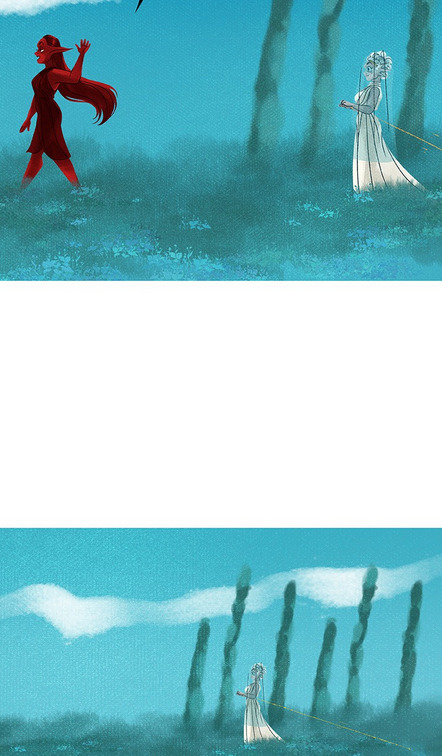
This chapter also have moment where the two frames with same art doesn't work. These scenes aren't emphasizing anything.. nor are they something that couldn't be done with a single frame. We two frames to have hades look worried? It isn't anything that isn't made clear in the upcoming scenes and it really doesn't signal anything to us as the reader that we don't get from anything else. That and sleeping persephone, which is to set up the scene in the bedroom.. but again.. it's nothing that couldn't have been done with the single panel. That along with the large white gapes between panels means that alot of the time there is a sense of time changing between them even if they are just a few seconds apart so having just a small change makes alot of the chapters feel less like a natural progression and more of a slog through.


also side note... the whole scene with hades preparing the breakfast is so sad.. but in a funny way. Like why is the breakfast just a donut.. what the hell did he put in the water (like seriously I feel like I'm missing something and am just an idiot). Along with the fact that hades house is loosing shades of blue each day and slowing becoming the same thing, soon it's just gonna be a single blue colour.
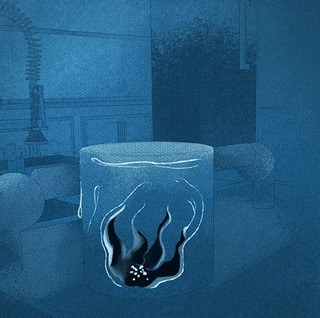

Now to the main points of the chapter, starting with the thetis and minthes conversation... which is ehhhhh. I think it's a good scene but it just... feels lacking for what it's supposed to be. Minthe is a character that was in the story since the beginning and her toxic friendship with thetis was set up so early on.. and the ending is just a calm conversation. It's a similar problem to the kronos fight.. were it just went to easily to be very dramatic and compelling.

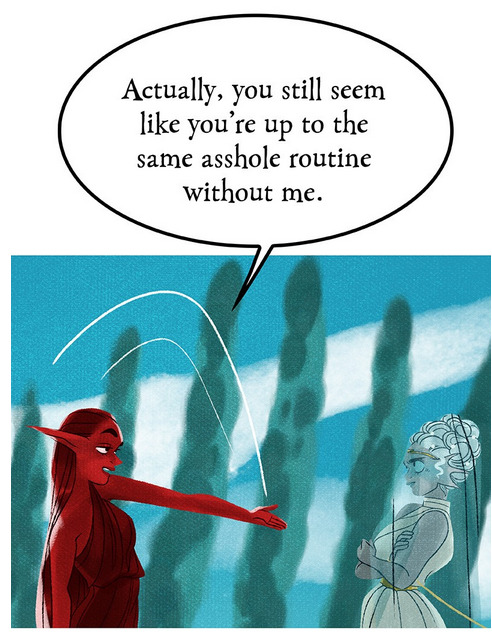
Again, why isnt there no dramatics to it. Have Minthe actually consider it for a moment, or maybe agree to her offer to party reflexively before pausing when they are about to leave. It's a problem with alot of the people character arches.. this is supposed to be the big exciting ending of minthe character arch.. and there is nothing to it... There is very little emotions.. have thetis get actually honestly angry, have minthe stand up for herself.. or even a few panels of her being a bit shaken after the conversation.
Just something, anything. to add some honest strong emotions to it, like irl yes this would be the best outcome... but stories are supposed to be dramatized. Minthe looks more bored at this then actually effected, and Thetis looks just mildly annoyed then actually angry.
Though on a more positive note, I love the class for minthe. I think it fits her alot better then any teaching childrens class can go. It takes the minthe teaching other route to something that feels like it actually fits minthes character. It's great choice and I like it for minthe.

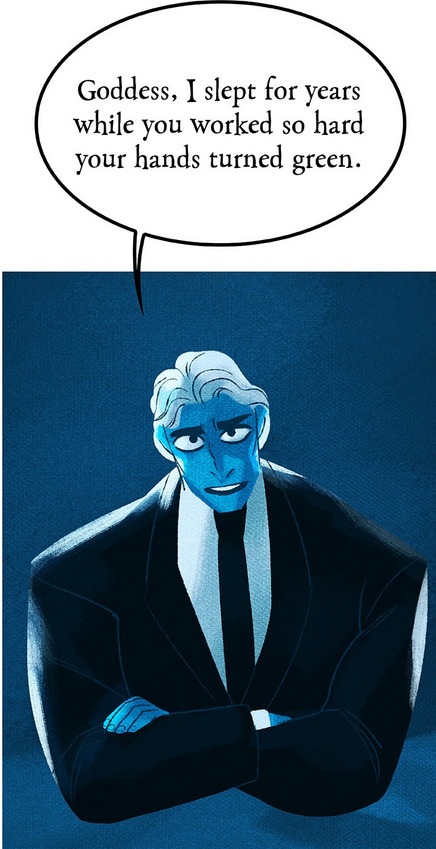
Though I think that this desperately shows how much persephone needs a few scenes like this... we are being told she's doing great things, is helping so many people, and is working constantly... but we aren't shown it. Just a few small scenes like this would go along way to actually show it.
Plus, I feel like the chaotic line of flashbacks and current events really are worsening the story. We entered this group of flash backs by seeing Demeter return from earth.. and minthe flashbacks don't start cause of anything to actually do with Demeter? she doesn't go to talk to her... or anything.. and it's just would have done alot better if the flashbacks weren't flashbacks and everything just happened in order.
i will admit that this chapter is the first in awhile that honestly made me feel a bit sad. the.. sort of flashback in the middle of the episode.. which again would be better if just done in order. That shot of Demeter being just full fucking devastated, it's truly heart breaking.
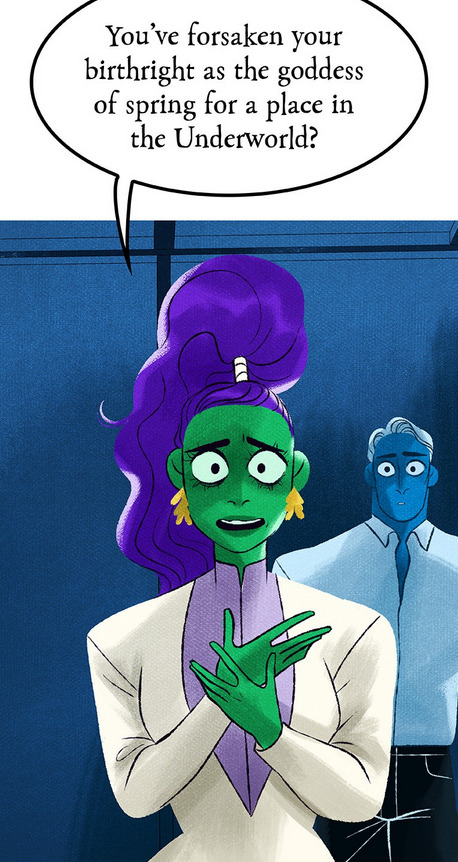

That and this line from persephone is something that just.. feels off. Cause I can see that what rs wants Demeter to be "greiving for the life lost", but like... rs hasn't done the best idea showing that. Most of the time it seems that Demeter is just fucking terrified her daughter is gonna be stuck in an abusive relationship. During the original argument most of her point were about how she think hades is gonna hurt her daughter. Like it really should have been made clear that Demeter had a worry like persephone says.
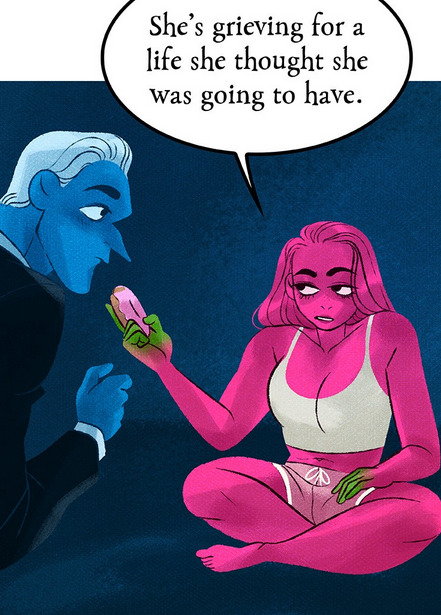
Another thing that really sucks is how basically no one gives Demeter any support. We see hecate what has been told to be a close friend to demeter having visted her... not give much thought to when told that she's upset. It's basically just "oh damn that's bad for you hades... well anyway lets move on!" The scenes goes from hey demeter is currently really upset... but we gotta make sure is everything is ready for Persephone. There is little to no actual worry for Demeter or her feelings.. it always circles back to how either hades or persephone is feeling.
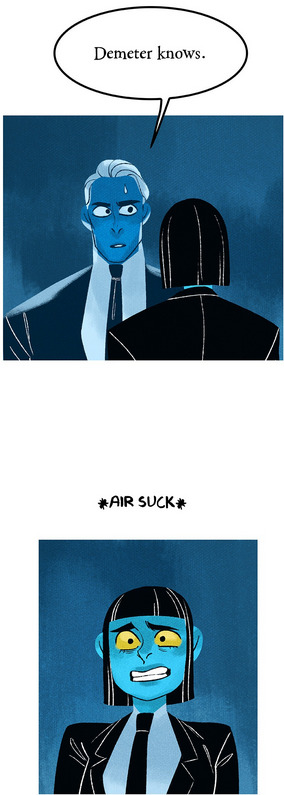
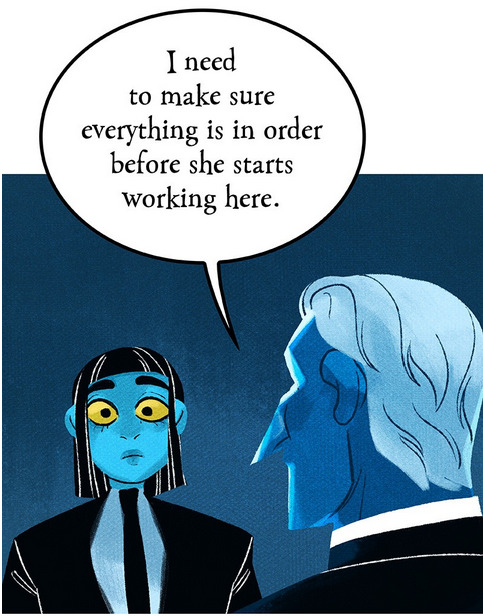
Lastly I think that lore olympus best plots are the character focused ones, kronos was probably the lowest point in the story cause there was no building up. The best points were the ones around Persephone dealing with the stress of her life with some fantasy elements tied into them. I do think continuing to explore the kronos part is... alright but i have very little trust that it'll be done well.


Also like... this is the worst cliff hanger yet. "we need to go talk to my father" proceeds to not talk to his father for at least three episodes... like come one man.. could have at least looked had a scene were they talk to kronos and he doesn't say anything.
63 notes
·
View notes
Text
“A Queer Who Cares” : The Intersection of Class and Queerness in Tokyo Godfathers

Tokyo Godfathers is a Japanese animated film, made in 2003, that follows the adventures of three homeless friends on Christmas Eve in Tokyo, Japan. Throughout the movie, we follow Hana, a transwoman and former drag queen, Gin, a middle-aged man with a gambling addiction, and Miyuki, a teenage runaway, as they find a baby in a trash can and spend Christmas Day trying to reunite the child with her mother. A comedic adventure quickly ensues, as the chaotic but loving trio, do their best to take care of their new baby, solve the mystery of her appearance, and all the while combat the dangers and prejudices that come with being homeless. Though predominantly a comedy, the film also strays away from its humorous tone and delves deep into the characters’ complex backstories, emotionally exploring the myriad of reasons why Hana, Gin, and Miyuki are homeless and why getting the baby back to her mother is so important for each of them. Directed by the famous Satoshi Kon and loosely based on the 1913 novel “The Three Godfathers”, the film explores themes of parenthood, found families, classism, transphobia, and addiction, and illuminates the complex ways in which these forces interact and impact daily life. In essence, Tokyo Godfathers effectively explores themes of transphobia and the intersection of classism and queerness, and though not entirely unproblematic, is unique and powerful in its complex characterization of both Hana as a character and the oppressions she faces as a transwoman who is homeless.
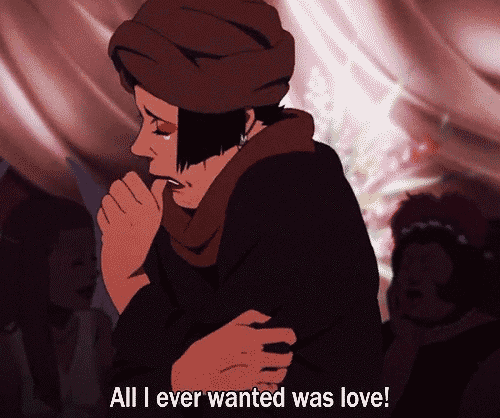
(Hana speaking about her desire to be loved)
Before beginning, it is important to note that the following analysis is of the 2020 English dubbed re-release of Tokyo Godfathers by GKIDS. As of now, there are many fan-subbed versions of the film circulating on the internet that misgender Hana in their subtitles. The GKIDS re-release does not so I will not be addressing that form of transphobia in my analysis. Similarly, in the original Japanese version, Hana is voiced by a man, and the fluctuations of her voice, from high and feminine when she is happy, to low and masculine when she wants to be intimidating, is present and follows a very transphobic trope in comedy. In the GKIDS dubbed version, Hana is voiced by Shakina Nayfack, a transwoman, actress, and activist, and these vocal fluctuations are not present so, once again, I will not be addressing that form of transphobia, as it was not present in the updated version that I watched.

How Shakina Nayfack used her voice to reclaim trans representation in animation
(A short article on Shakina Nayfack, the English voice actress for Hana in the 2020 GKIDS re-release)
youtube
Though Tokyo Godfathers does not have the popularity or mainstream attention to be considered a breakout text, it’s humanizing and complex characterization of Hana breaks traditional transphobic tropes, particularly in comedy, that lends itself to “creat[ing] small cracks in the glass ceiling of cultural consciousness and makes room for future breaks” (Cavalcante, 2017, p. 4). Hana is the main protagonist of the film. She is both the center of comedic relief, the leader of her found family and the driver of the plot as a whole. It is through her desire to fulfill her dream of becoming a mother, and her desperate need to understand why parents abandon their children (as her parents did to her), that motivates her, and in turn, her friends, to find the child’s parents themselves, instead of going to the police. It is in this complexity that Hana, “breaks historical representation paradigms” of both trans characters and queer characters as a whole (Cavalcante, 2017, p. 2). In her desperate search to love and be loved, Hana is immediately humanized, her identity centered in love and family, and not in her gender or sexuality, as so many queer characters are. In addition, she is not portrayed as “sexless” as is the norm for queer characters, wherein they can exist in media as long as their love stories and intimate desires do not. Though very subtle, Hana is the only character in the movie that has a love interest, Gin, and she had a boyfriend, who died, but is still a key part of her characterization. Though these love stories are not centered in the film, they are the only ones in the movie, and this exclusive existence, unique to Hana, illustrates their importance to both the themes of the movie and Hana’s character.
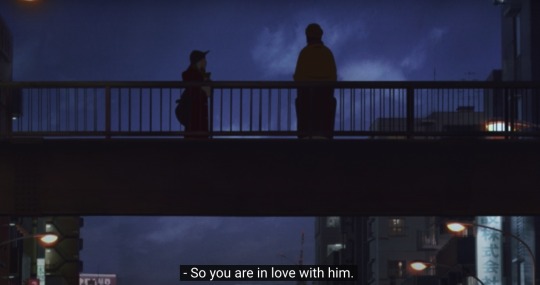
(Miyuki asks Hana about her feelings for Gin)
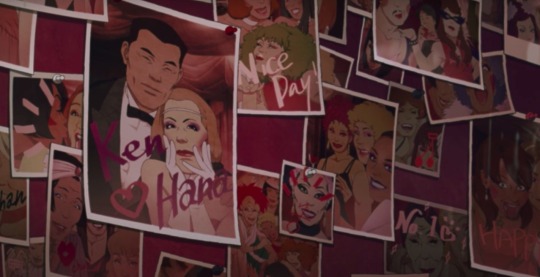
(A photo of Hana and her ex-boyfriend Ken at the club she once worked at)
That is not to say that the queer representation in this film is by any means perfect. As mentioned, the movie is a comedy and thus falls into the historical “preponderance of these representations occurring in the comedy”, especially given that Hana is the comedic center (Dow, 2001, p.130). Even more so, there are instances in which Hana’s trans identity is stereotyped and used as the joke itself. In one scene, she flirts with a cab driver knowing that he is uncomfortable by the fact that she is a trans woman, and his transphobia is framed as comedic. She also has a very flamboyant personality, with sharp emotional highs, and equally dramatic lows, that once again plays into stereotypical representations of transwomen as over-the-top and overly dramatized to the point of ridiculousness. In line with this, her previous line of work was as a drag queen, and though scenes of her in the drag community are dominated by a sense of love and community, it still plays into already established tropes of transwoman living as a performance. In these ways, her representation at times leans towards the role of the “clown...putting on a show for The Other” where it is “never quite clear whether we are laughing with or at this figure” (Hall,1995, p. 22). However, as mentioned above, Hana’s complex and nuanced backstory, combined with her frequent acts of heroism and her leadership role, make it so she is deeply humanized. Though her dramatic personality falls into these stereotypical tropes at times, it does not detract from her character arc of motherhood and finding love, a nuance that is missing from many stories of trans women in media.

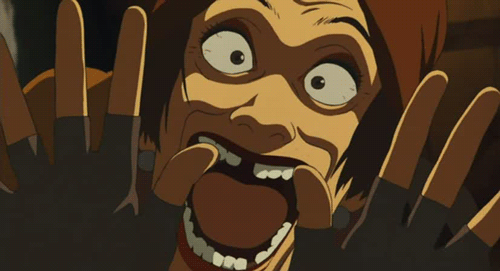
(As pictured, Hana’s emotions are very dramatized and quickly jump from very high to very low)
This nuance is heightened through the intersection of classism and queerness, which is an equally prevalent theme throughout the film. In particular, class struggles are illustrated through medical care. At one point, Hana falls ill, and Gin is forced to give away his life savings in order to pay for her treatment. It is also here where Hana’s gender identity is questioned, as the hospital houses her in the men’s ward, and she explains that she “is not pleased with this”. This particular intersection of class and queerness within a medical setting is impactful given the long and “oppressive role of medicine in trans people’s lives” (Keegan, 2016, p. 607) and the strong tendency of media to tell trans folks stories, about both life and transition, in a way that is medicalized. For Hana, the discrimination she experiences at the hospital, and her inability to pay for her treatment, illustrate the violence of intersecting oppressions of queerness and homelessness in medical systems, while also straying away from the problematic representation of trans folks that are centered around a rhetoric of medicalization. More visually, the family is also a key illustrative example of how class and queerness are explored. The trio is constantly visually contrasted with traditional Japanese families in a variety of settings. This harkens back to ideas of “alternative forms” of families that queer folks create and this difference is visually exasperated by the trio’s homelessness, making them stand out in whatever space they are in (Keegan, 2016, p. 607).

(An angel asks Gin if he would rather have her magic or an ambulance. He chooses the ambulance.)
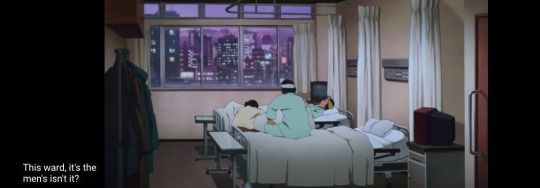
(Hana in the hospital. The subtitle reads “This ward, it’s the men’s isn't it?”)
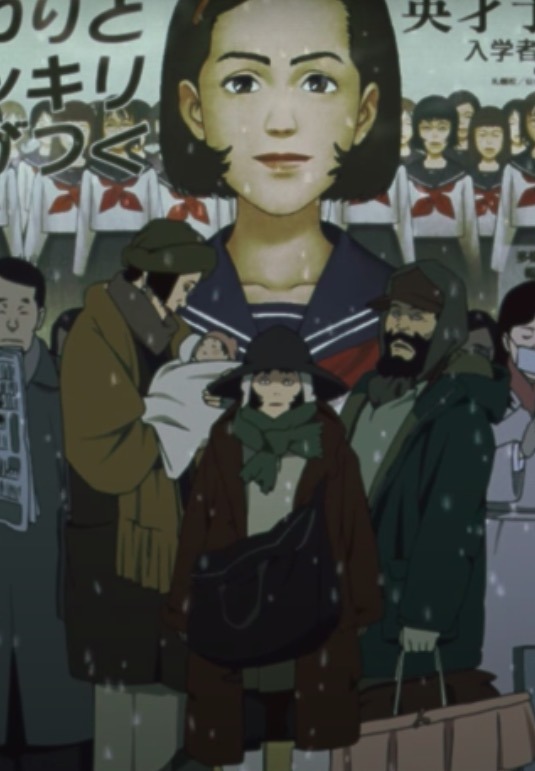
(One of many scenes where the trio is set up in familial positions)
As a queer, white woman living in the United States my subject positionality had a great effect on how I consumed the movie. Most notably, I was born and raised in Western society, and given that this film is Japanese and made for Japanese audiences, there is a variety of cultural norms and perceptions that I did not pick up on because of my lack of familiarity with them. In the same vein, I watched this movie translated into English and, as with every translated work, there are words and subtle, yet important, nuances in the language that were very likely lost to me as a viewer. My identity as a queer woman made it so that I was drawn to Hana as a character and was very moved by her deep desire to be a mother. The movie is steeped in images of Hana and her friends encompassing the idea of a non-traditional family, and since I would love a family of my own one day and I expect that to look different than the dominant nuclear family norm, I really focused my experience on the variety of nontraditional families that this movie shows, all of them as loving as the next.
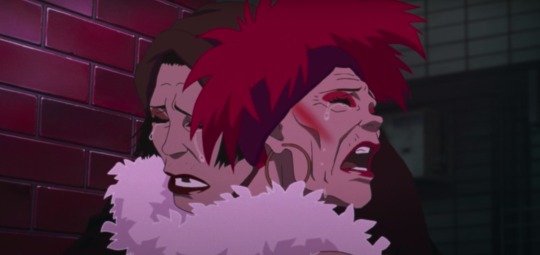
(Hana and her drag mother reuniting)
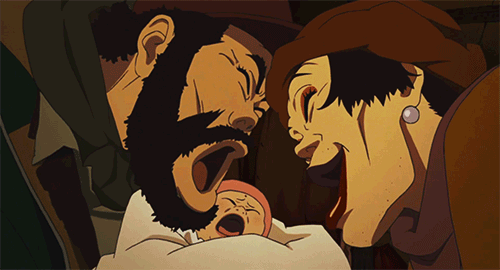
(Hana and her family)
As a whole, Tokyo Godfathers, though not without its faults, is a refreshing take on the traditional feel-good Christmas movie trope, delving into class and queerness, and using the two to explore what it really means to be a family that is loving and kind. Spoiler alert, that family looks a little something like one ex-drag queen, one man with a gambling addiction, a teenage runaway who loves cats, and their baby they found in a dumpster.
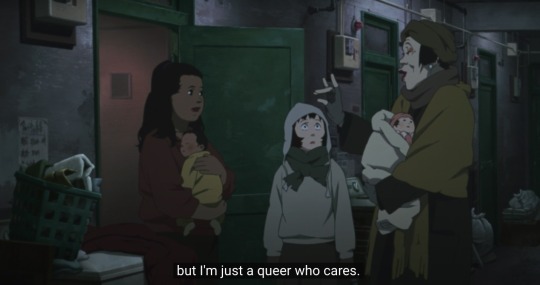
Sources
Dow, Bonnie (2001). “Ellen, Television, and the Politics of Gay and Lesbian Visibility.” Critical Studies in Media Communication 18(2), 123-140.
Cavalcante, Andre (2017). “Breaking into Transgender Life: Transgender Audiences’ Experiences With ‘First of Its Kind’ Visibility in Popular Media.” Communication, Culture & Critique, 1-18.
Keegan, Cáel (2016). “Tongues without Bodies: The Wachowskis’ Sense8.” Transgender Studies Quarterly 3(3–4), 605-610.
Hall, Stuart (1995). “The Whites of their Eyes: Racist Ideologies and the Media,” in Gender, Race, and Class in Media 3rd ed., pp. 18-22.
#tokyo godfathers#queer studies#Queer Movie Review#trans woman#trans representation#found family#christmas movies
179 notes
·
View notes
Text
S2 Finale
for once i’m actually going to watch the episode again and get my thoughts down as i do cuz holy hell was this well done, i think
“Comet” playing first instead of the OP was brilliant. Also, as a note, the full music video of that came out, along with some killer animation inspired by the manga.
youtube
A detail i love about this music video is Ibuki spotting Free’s motorcycle light in the side mirror before he stops the car and, well, yeah
They actually show Louis reaching for his gun pretty early on into Ibuki’s monologue. I don’t think the manga showed that, but I could be wrong. He definitely has it pointed to him when it’s pitch black same at the anime, but the fact he reaches for it so early means he obviously knows what’s going on, even if he couldn’t pull the trigger.
predictably, the anime does the “darkness” as it always has, with the dark-blue background and bright lines for the characters. The Comet music video does this part of the scene better imo, but it’s not too much of an issue. Free’s whole bit is obviously rushed, and I think the anime suffers for that, but i understand that they couldn’t fit it in. We do miss him escorting Louis out of the BAM though, and also saying he’ll eat Louis if he comes back. That said, I don’t know how Louis gets back...I guess Free drives him back still but we just don’t see it
The Riz and Legosi fight has Riz getting the idea of eating Legosi in his head now that was seemingly missing before. In the manga he was thinking about how he’d become friends with Legosi by eating him, and that never came up in the anime until kinda now. Like I said before it’s an interesting part of Riz’s character so i’m glad it’s touched on a bit at least.
The moth scene is just as confusing here as it was in the manga...and without explanation or confirmation that it’s imaginary chimera (a part of the manga plot that was completely dropped), it just seems like...something. We don’t have Moth-san talking to Riz here or him questioning what he’s seeing so...it could be seen as purely metaphorical but it still remains a mystery (and just like in the manga it accomplishes nothing here cuz Riz just gets up and wails on Legosi)
It looks fucking cool though! Word of Power: Respect for Life!
It’s all one shot here, so we see every wound inflicted on Legosi, which is only a few slams. In the manga it’s implied he endured way more. That just follows the pattern of the anime, though, where violence is toned way the hell down. I’m not complaining, though. I don’t want to see Legosi hurt...
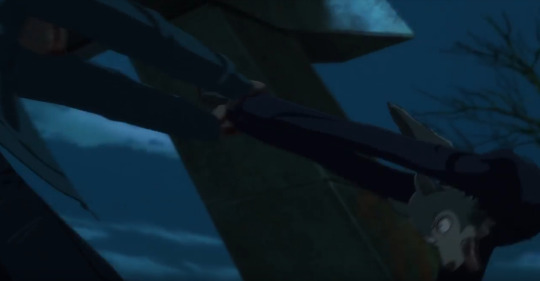
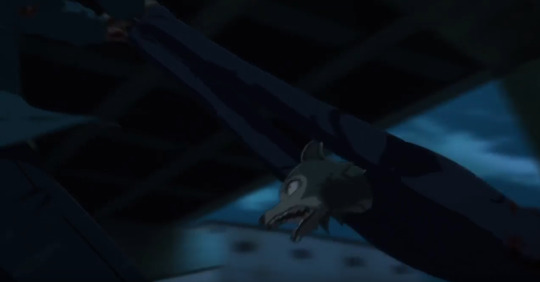


I knew what i was seeing when it was in motion, but damn does it look fucking good! Orange really is showing how to do CG right by properly stretching models for intense movements and actions! They’ve done this subtly before but here it’s very clear, but not distractedly so (unless you pause frame by frame)
However, I still do think the models look a bit stiff when just...like...walking normally sometimes. Like we have this great fight animation but then Riz picks Legosi up and drags him a bit and he looks...off. Ah well
The whole bit about Legosi exposing his stomach doesn’t have the subtleties explained here...and really the anime leaves out a lot of character thinking but i think if they left it in it’d be a bit too hammy and crowded, so it’s fine that they cut it out. But still...tell me more pose isn’t as funny here :(
Legosi’s voice acting shines again here. He sounds really fucking hurt...
The moon cut and then them laying together is nice. Also i do like how there hasn’t been music up until this point at all. Riz talking about everything is nice too...I don’t remember him saying he feels like he could cry in the manga, due to him not remembering anything about Tem but his taste.
Legosi says: “I almost went through the same thing Riz did. If someone hadn’t snapped me out of it, my love for Haru might have made me eat her.” I recall he says something similar in the manga too...but like the only time he ever got close to eating her is when he didn’t know who she was. It really doesn’t seem like the same thing at all...it ties back into Legosi really seeming to have a really firm grasp on everything, all things considered, and he’s just selling himself short. I guess he could also be talking generally but really, he never had a moment where he wanted to eat her again after that first night. And the “someone” who snapped him out of it...Zoe???? Like, I’m just a bit puzzled on this part. I think what it really is is a reference to what he says to Louis later, how he’s the one that guided him and ensured that he is the way he is. Ensured that he did so well to begin with. Like, writing it out like that makes sense, but I guess I’m taking the words too literally.
Anyway, was typing my thoughts out there. I don’t think it’s entirely clear that Louis’s influence is what caused Legosi not to eat Haru after they started spending time together, but if Legosi says that’s what it was, that’s what it was. I felt that Louis’s guidance for Legosi was more about him accepting himself as a carnivore and using his abilities for what he believes in instead of thinking he can only do harm with them...not about controlling his meat eating instincts. I guess it kinda goes hand in hand. Anyway
The hand touch is, well, touching like it was in the manga, however Riz firmly regrasping Legosi’s hand to hoist him up and continue fighting and Legosi sounding surprised isn’t what i pictured. In the manga i saw it more as Riz slowly doing it and Legosi just being too weak to do anything about it. Riz has the advantage, so he can afford to make the action slow and deliberate
Ok here’s where things get interesting. Louis’s appearance is entirely different in the anime, whereas in the manga he appears behind Riz while Legosi is talking to him, with Legosi spotting him and using a distraction to escape with him. HERE!!! Louis actively stops Riz from attacking Legosi again, clearly out of breath as he ran all the way there, but he still has the mind to appear cool and collected and make a lil quip that pisses Riz off. And then when Riz charges him Louis is just walking calmly toward him like!
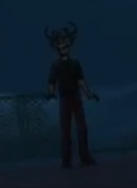
Like yeah, he does stop and react a bit, but he sees Legosi coming up to stop him so I suppose that’s why he stands his ground (honestly though was he gonna pull his gun? Did he have a plan? I feel like he just got there without one, which makes sense. He just had to stop what was happening no matter what)
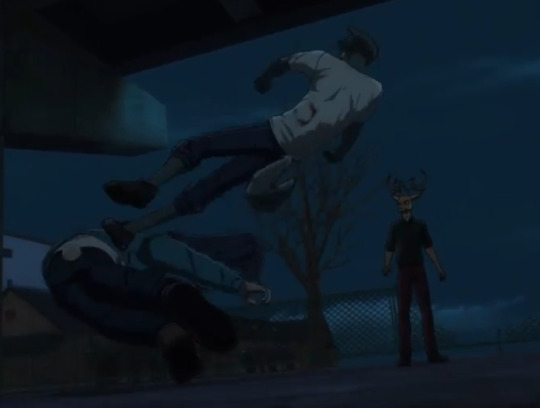
And Legosi ragdolls Riz aside to protect Louis. Love wins
Pina scene is the same here. Although previously we didn’t get his thoughts about how he never wanted to get involved with carnivores ever again cuz of these two, but that ties into the whole “anime doesn’t say every single thought that’s in a character’s head like in the manga” thing. I think it’s interesting that they even bother showing him retrieving his phone from the trash bin, since he could have easily just got it from his pocket but it shows that Riz was smart enough to take it away from him (but not smart enough to destroy it or chuck it somewhere or hide it where Pina couldn’t see)
The next scene with Legosi and Louis up on the outcropping..Legosi mentions how this is his last New Year’s. He’s more convinced he’s gonna die than it seems in the manga (although depends on the subs i guess)
The part where Riz is looking up while Legosi is talking about their fight to Louis...i never knew if he was supposed to be hearing that or not, here or in the manga. I guess it’s up to interpretation.

Legosi delivering this line in the manga: determined, stoic

Legosi delivering this line in the anime: clearly in love

we finally get one of these scenes for Louis! Season 1 had a few of these for Legosi and Haru when they had moments where they were deep in thought about the other. I thought that Louis’s would have been in his initial meetup with Legosi in the manga, but that scene got cut. It’s cool that they put his here, though! Also correct me if I’m wrong but I think this is the only shot like this in season 2
When Louis’s theme starts here when he’s acting strong, trying not to cry, I thought it’d slowly start to break down as he did and transition into a new track but it just kinda...keeps going. It sounds like a more somber, shaky version at the very least but I think the music at this part is a bit lacking...thankfully the animation and Louis’s voice acting more than make up for it
Boy, does Louis really cry. I’m glad they let him let loose like that but the bad thing about seeing it animated is...they don’t hug! I always wanted a hug here...one that Louis fully embraces unlike the earlier one on the balcony. It makes sense the Legosi doesn’t try to do anything and is taken aback, of course, but damn...and considering how Louis is treated later and at the end of the series...it stings a lot
Idk what to say about this scene...it’s done so well. Louis having his internal monologue, talking to Legosi...Legosi looking so damn guilty that he wants to go back and fight...the transition to the foot reveal...it’s all so good
A change here in the anime...Louis is a lot more steadfast. He offers his foot and is like, completely at peace with it. In the manga he’s still shaking and his expressions are like, more unsure, but here he seems a lot more convinced that it’s what he has to do
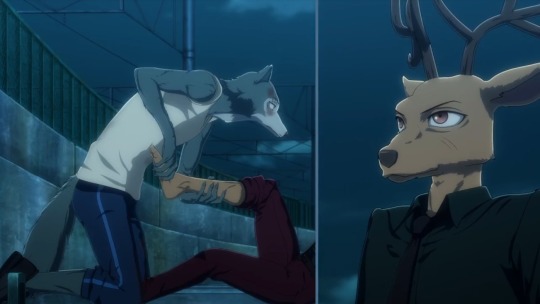
jeez
Legosi’s thoughts about how eating his leg feels almost ritualistic and it actually makes him desire and hunger for it is gone...which like, idk why it is. We just hear Legosi say that he wants to but we don’t feel it (we do see his lips pull back and reveal his teeth tho)
Enter: Buffgosi. This happens in the manga but since Legosi’s model is so much smaller in the anime it seems like a much more drastic difference.
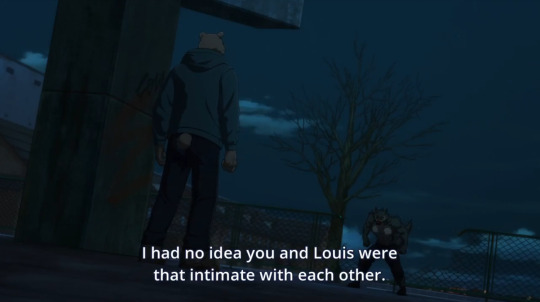
intimate...
Legosi doesn’t apologize for not being able to stop growling, but it seems like they did a lot to remove any humor Paru put into these scenes. I guess it doesn’t work that well in one continuous scene vs. chapters broken up by weeks
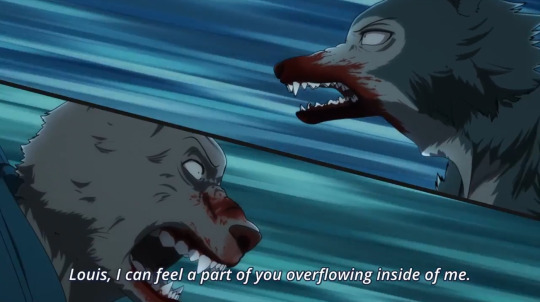

Louis’s funny deadpool moment is changed with him just...telling Legosi to be a hero again. Guess he really likes that line. The way it’s delivered really feels like a video game, like Legosi is recovering from a hit and Louis pops in to heal him with some words

Seriously, Louis just keeps making this face...after an entire season of being super serious and stone faced he’s looking softer
the Riz and Tem story isn’t changed at all, and can still be read as either romantic or platonic. Seeing it in motion makes it hit harder though, for sure
Legosi still wishes Riz a happy new year here. He seems a lot happier here than in the manga. Also Louis doesn’t berate him for it, instead opting to speak up and talk to Riz here after hearing about his heartbreak. He does it without the pressure of the cops being there, and it truly shows that he really does like carnivores and sympathizes with their struggles now.
Yeah, so the cop scene is gone, which kinda condenses and cuts out a lot (including Pina’s small appearance) but I kinda like it better. It allows all the characters to breathe. Legosi thanks Louis naturally for the meal, and Louis telling Legosi to wipe his face is done in a friendly, joking manner...it just all feels a lot softer and friendlier without the cops being there making it all fucked. Just like in real life
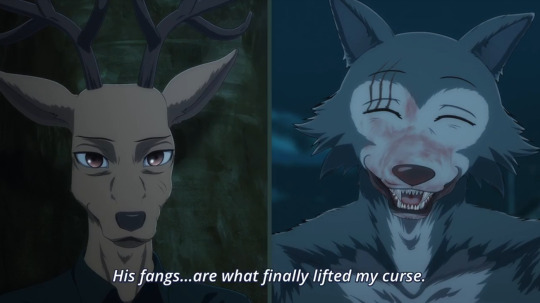
THERE IT IS THERE IT FUCKING IS THEY EVEN GAVE LOUIS HIS LIL SMIRK AAAAAAAAAAAAAAAAA
god i keep tearing up around these parts IT’S BEEN ALMOST 2 HOURS SINCE I STARTED MAKING THIS POST GOOD FUCKING LORD
I kinda thought they might put the aftermath in a sort of credits scene, and i think it works, even if it does pave over some important stuff

god it’s just so validating to see Legosi care for Louis and Haru equally. Like we all know it’s the case but they’re both dear to him

Now this is a far departure from his thoughts in the manga. I suppose it only fits with the ending of the season to make it more optimistic, but we skip the while “you can’t marry an herbivore cuz of your record” thing...but here he still cherishes it in a way. Very interesting. Wonder if they’ll backpedal on it in season 3
Legosi actually tells Haru he’s dropping out here too! He still does in the manga but it seems more abrupt there, like he already did drop out and then goes to tell her instead of telling her before he does. He’s also not suffering through his meat withdrawal here like he was in the manga at this scene (or at least the manga’s counterpart at Haru’s house)
The ending convo mirrors what Haru says to him in that scene too. It’s a funny way to leave off on the season without a stinger or anything. It just kinda makes the audience question their relationship (and now that Lougosi is pumping through everyone’s veins...hehehhehehe)
uh, well, anyway, i kinda wasted all of my time off after work writing this so...i hope you enjoyed it? Not gonna get one of these for a while...i know at least some of you like them
Also...what the hell was the extra “broadcast only” scene??????
Well, anyway, I hope you all have a good day, night, whatever, wherever you are. And remember: Legosi and Louis are in love
#ok this is long#this is kind of my love letter to the series too almost#this is the definite high point of the story and it delivered#lougosi always and forever
36 notes
·
View notes
Text
Younger post-ep ramble 7x01
I joked in my finale ramble at the end of season 6 that the episode was called ‘Forever’ because that’s how long it would feel between seasons...well joke's on me because now, after 587 days, we are FINALLY here. The Younger drought has been a tough one, but we have been generously compensated by getting the first four episodes all at once, which is both exciting and also, turns out, incredibly overwhelming. As usual the thoughts and feelings are many, mostly feelings (read: I am NOT ok) but let’s start off with a delve into the premiere episode, ‘A Decent Proposal’.
The episode picks up within minutes of where the season 6 finale left off, with Diana and Enzo not wasting any time to hot foot it out of their wedding reception and into their happily ever after (Arrivederci bitches!). Of course I’m very happy for Diana and her happiness but there’s only one couple’s happiness that I am on tenterhooks about now that Diva is sorted and that is Charles and Liza, as they watch their sprinklers fizzle out in some sort of awkward, symbolic, anti-climax.
You may recall that mere moments earlier, Charles had popped the question on the dancefloor before the two were separated by an obligatory conga line, and Charles quickly assumes that Liza’s lack of enthusiasm to shout her answer across the reception of another person’s wedding is an answer in itself. As anyone who has read my rambles before knows, I unapologetically fly the Team Charles flag, and let me tell you, despite her supreme stalling techniques (you’re not divorced yet, we should probably speak to the children blah blah), hearing Liza say, ‘my answer is, I love you’, my jaw hit the floor. I’m sorry, did Liza Miller just declare her feelings openly and directly and with absolute certainty??? We’re 33 seconds into the new season and I AM SHOOKETH DARREN.
Speaking of declaring feelings openly and directly, I love absolutely everything about this opening scene. The music choice was perfect and really helped build the moment, as Charles told Liza he understands her hesitation before un-asking her to marry him (so that when the she’s made her mind she can pop the question - I kid you not, this has always been my dream...). The music cutting out and just hearing the crickets as Liza asks if he’s really withdrawing the proposal, his quip about her having to make the next move, assuming he’s still on the market (I love/hate this foreshadowing btw), it is Charles/Liza banter at its best and my sappy heart was soaking up every morsel. Throw in some CGI fireworks and the observation that they are sign (which may or may not play out at a later date) and you have yourself a pretty darn near perfect start to Younger’s final season.
Speaking of talking openly and directly, one of the staples of the Youngerverse, the Maggie morning debrief, is back as our way to gain insight into the thoughts, feelings and ponderings of Liza. Straight off the bat I am very pleased that Maggie has fully committed to ‘Chaz’ for Charles and I’m even happier that we actually hear these two talking about what’s going on because honestly, the last couple of seasons the Maggie/Liza convos, which we traditionally rely on heavily to know where Liza is at and to hear Maggie’s sage/sometimes terrible advice, have been skimmed over or felt rushed. We are also reminded that Liza has indeed seen Charles’ goods (the Empiriconda, she’s meaning the Empiriconda) and that the sex is hot, because we need to have all the information on top of the declarations of love to highlight how their relationship is pretty much perfect so that what transpires is even more painful.
Other things that are painful include the fact that Diana will be decidedly absent for most of the season (to be fair scheduling/covid are pretty legit reasons and in ep 1 we can chalk that up to her honeymoon, so more lamenting on that later), but early on it provides some pretty fab Lauren Diva-worshiping. Donning a baroque print Moschino suit that would’ve made Fran Fine jealous, Lauren is clearly distracted by the responsibility of her interim role at Empirical, as her mother frets about the theme for her 30th birthday party over face-time.
Keeping up the chaotic energy, we also discover that Kelsey has to go and let Quinn know she no longer needs her money (these characters’ ongoing relationship with the woman who has tried to ruin all of them at some point really needs unpacking with a good therapist at this stage) and Josh is in full frantic dad mode because he thinks Clare is trying to kidnap Gemma (lol that Lauren straight up calls her out on it later). Two quick points here:1) love seeing this side of Josh and 2) love Kelsey’s calm, measured reassurance that of course Clare would want her family to meet Gemma. I will say though, Josh meeting Rob for the first time when he’s about to go with Clare and Gemma to Ireland and hearing this guy he doesn’t know from a bar of soap exclaim, ‘I’m just in love with your daughter’ was super unfair. Not cool Clare, not cool.
Kelsey keeps her cool as she breaks the news of her change of heart to our fave resident villain, who comes complete with a bowl of fortune cookies she ominously encourages Kelsey to consult while also enjoying her own fortune, ‘a new love will come into your life’. It’s all very OTT and ridiculous in it’s obvious foreshadowing and I am here for every minute of it because I sincerely love to hate Quinn very much.
My love of all things over the top is further fed by Lauren entering Diana’s office and making her way to the desk - the music, the way Lauren looks at the framed picture of Diana and Enzo before relegating it to the drawer, any moment I was expecting her to utter ‘my precious’ as she became more and more entranced by the power of the neckwear, before Liza abruptly broke the spell by asking what she was doing and warned her off her consideration of claiming Diana’s office as her own. Very much appreciated the continuity later in the episode when Liza is very distressed that Lauren has gone full-Trout with the chunky baubled ornament around her neck, though Lauren is less Invasion of the Body Snatchers and more Nancy Drew at this point, as she has caught wind of Charles’ proposal while reviewing video footage from Diana’s wedding which she decided, for some reason, to show Josh, who was ‘still not interested’ (we hear your words Josh but your face says otherwise). I am very on board the Liza/Lauren dynamic and their ‘circle of trust’ as Liza asks that Lauren keep the proposal to herself (we really haven’t seen the friendship between these two much) and Liza’s gratitude, ‘Thank you...Di-va’, is hilarious, as is the response, ‘my pleasure, Queen’.
We get many fine moments in the office this ep, the first meeting when there are formal announcements and speeches made welcoming Kelsey back...to a conference room of Charles, Liza, Lauren and a random guy we’ve never seen or heard from before and never will again it seems. It makes me laugh that every person in the room except the dude we’ll never know already knows everything but hey, formality is important I guess? The pitch for ‘Little Women in Space’ by an author played by an actress who is friends IRL with Sutton Foster and they were in the musical Little Women together is honestly too much but also just the right amount and this show does meta so well (not to mention Lauren’s excited outburst upon realising her party theme plus her making sure Liza knows that she knows about the proposal. Subtle as a sledgehammer is our Lauren).
One not-so-fine moment is the extremely out of left field resignation of Zane followed by the completely douchey moment of him breaking up with Kelsey via face-time with the line, ‘I love you Kelsey, take care’. I’m sorry, what?? On the one hand, I get it that CMD wasn’t available for the season so in some respects better to deal with it swiftly and move on, but it was very abrupt and strange. I had zero investment in the pairing so it doesn’t overly affect my viewing, but any fans out there shipping those two, are you ok? Because that was a brutal way for a pairing to simply cease to exist.
So we have I love yous being thrown around by Kelsey and Zane as they break up because that makes sense (in retrospect I should’ve seen what was coming because these words clearly mean NOTHING *breathes deeply, exhales slowly*) but thank goodness Liza is there to comfort Kelsey, whose statement that she really doesn’t care would be a lot more convincing if she wasn’t crying inconsolably. We get a beautiful transition from Kelsey’s office to Charles’ with a sweeping aerial shot across the autumnal canopy of Central Park along with the gentle music adding to the relaxed pacing of the episode. Liza doesn’t want it to be weird between her and Charles now that the proposal is out there (well actually, its 100% in her court but yes), so he reassures her it’s not weird at all by planting a kiss on her that almost triggers the sprinklers because friends, it is HOTTT. Cue super cute exchange about pro and cons lists, lovingly looking into one another’s eyes and then, another ‘ I love you’ from Liza to Charles followed by Charles responding, ‘I love you too’, and despite my deceased status at this point, it was magical. But also WHAT. IS. HAPPENING.
These two are so enamoured with one another and it’s as though it’s something they just say to each other all the time, but this is literally the first episode we’ve heard any kind of expression of feelings to one another since the season 6 premiere and even then it wasn’t this direct; Liza ran away and Charles told her he didn’t mind not being at the office because he did it for the woman he loves followed by a cute story about how he can do maths because he’s had feelings for her for 16 years. Don’t get me wrong, the entire scene this episode was perfect and it was SO well done in the way it captured the best parts of their dynamic (damn you Darren Star for being so good at what you do), but it also felt like we were being shown the dream version of what could have been before it’s all snatched away.
Not unlike Millennial, which is like naming a business Boomer Print according to the table of boomers at the investor meeting who blindside Kelsey and Charles by voting to restore the name Empirical (head boomer has clearly had it with millennials, indicated by his statement, ‘who gives a shit about millennials any more?’) and so it is done and Kelsey is officially having a very bad week. It is while enjoying a quiet bourbon in the bar that evening that Charles is joined by Quinn, who is allegedly on her apology tour to explain to investors why she dropped out of the Senate race, but also offers Charles what seems to be a sincere apology for treating his company like a toy (prediction: nothing is ever as it seems with Quinn). I have a confession to make and believe me, I don't like it any more than you do - they absolutely nailed the set up of tension and a little bit of a spark between Charles and Quinn in this scene IMO and I...I *whispers* I liked it.
What I liked even more was Lauren’s completely in character entrance to her own birthday party, omg it’s so ridiculous and perfectly her and Denise telling her daughter, ‘fix your crotch, good girl’ had me chuckling. I feel like we’re getting Kelsey’s set up for the season at this party too, as she’s feeling unsure of what defines her now, and the conversation about defining things carries over into Josh and Liza’s chat when he asks her if congratulations are in order. This exchange between the two of them is just lovely, with Liza clearly feeling a little awkward talking to Josh about Charles, but Josh reassures her that he does like him, for her, and that it brings him joy to know she’s happy. They agree that their relationship doesn’t need to be defined, and that they'll always be in each others’ lives no matter who they’re with. It feels very final for their romantic relationship and I would be celebrating the end of the triangle had I not clocked Josh’s fallen expression as Liza walks away. I really do hope that Josh finds someone he loves and who loves him the way he wants to be loved this season. Josh’s words gave Liza some clarity of her own and so we find ourselves at the magnificent Seaglass Carousel, home of Liza and Charles’ first proper date, once more.
Charles is clearly full of hope and expectation as he meets Liza and they remember the time he and the beard we try to forget about brought her there and it’s all amazing and beautiful and...*collects self*...Liza tells him that she just wants to keep riding the perfect ride. She once again tells him she loves him (we’re up to three times in one ep now for those of you playing at home), that all she wants is his heart and that she wants to be happily unmarried to him every day. To say this does not go down the way she is expecting is an understatement; we learn that Charles doesn’t want a ride, he wants to get off the carousel and not live in a fantasy. He believes in marriage whereas she believes they are now finally free and folks, this is why you talk about your stance on marriage in a relationship BEFORE you pop the question out of nowhere at someone’s wedding.

You can see on his face, as Liza says she doesn’t want to define their relationship by the rules and obligations of marriage, that he’s hearing that she is not all in (whether that’s true or not) and he thanks her for letting him know what’s in her heart. You know the bit that actually plunges the knife into my heart? Charles shaking his head as Liza says his name, clearly overcome with emotion, before he kisses her on the head looking as though his world has just come crumbling down around him. That knife just gets twisted even further as Liza is left there in disbelief, (we are all Liza in that moment honestly), trying to process how her own declaration could be so easily rejected. You know, I knew it was coming, but it didn’t make it any less painful. I can see it from both perspectives and I have no doubt that these two characters have a lot they need to address and work through as a result of their own failed marriages if they’re going to have healthy relationships moving forward.
I tell you what, after so long with no new episodes, this first episode of the season was concurrently beautiful and heart-breaking and one thing’s for certain - this final ride ain’t gonna be smooth. Now if you’ll excuse me I’m just going to go and regain some composure so we can start on ep 2...
Season 6 ramble collection can be found here
#youngertv#younger tv#7x01#reiew#ramble#liza miller#charles brooks#kelsey peters#maggie amato#lauren heller#younger season 7#tv show
5 notes
·
View notes
Text
UNORTHODOX- The Price of Freedom
(Spoilers for the entire mini series Unorthodox)
Unorthodox is a very conventional story and also an unprecedented one.
It is at its core a coming of age story, a fish out of water story, a marriage story and a drama about finding a meaningful life. However it is also the first high-budget mainstream exploration of the lives of members of the ultra-orthodox Jewish community. It gives voice to a woman, and in-turn many women like her, who have never been seen or heard from in mainstream media. We are party to the self discovery of a woman who has had too much expected of her from God, her community and herself. She escapes to Berlin from New York, running away from a life without freedom to a liberal metropolis resting atop a historic centre of Jewish hatred, the regime her own grandparents had escaped from. The show refuses to give easy answers, happy endings or tragic melodrama: we are witness to a single part of Esty's story and in it we see her begin to assert power in her life or, at the very least, recognise she has more power over it than she had previously thought.
Esty's journey is shown in two timelines: her time in Williamsburg transitioning into a marriage with the well-meaning Yankee whilst under the watchful eye of the community and her time in Berlin, having befriended a group of liberal musicians who help her to adjust to the outside world. The scenes themselves are often matter of fact but the depth of the performances, the pacing, cinematography and music create an atmosphere that allows its naturalism to transcend into more than a slice of life drama. Berlin is distilled into its most outlandish: bars spill out onto the streets, clubs are loud and full of smoke, coffee shops are alien and austere, concert halls are modern and bright, fashion is extraneous, flesh is bared and squares are packed full of men and women from all walks of life. We can sympathise with Esty if her curiosity blooms or she gets overwhelmed by this modern world due to the sheer vividness of the city the show brings to life.
Between these frames, for most of the run-time, stands our protagonist: Esty Shapiro. Her world view is communicated quietly, often silently, in the way her eyes interact with the world around her. The subtlety of her characterisation is married with the movement of the camera: when Esty is stressed or determined we follow her closely, the outside world blurred into insignificance whilst when she chooses to observe the world, time is taken to pick up the sort of details she would also be acknowledging. From the smaller moments, like noting the strangeness of night club wrist stamps and the initial starkness of seeing queer intimacy shown in front of her without shame, or grander changes, like naked bodies at the beach or the beauty of an orchestra operating as a single organism-- the camera and Esty are unified. This makes us intimately aware of who she is, how much this experience means to her and, thanks to the flashbacks, how much she fights to be the person we see in front of us.
The behaviour of the Ultra-Orthodox community is realised with unflinching realism. Where lesser dramas would have made moralistic tales about any number of the themes touched upon-- post-Holocaust guilt, cultural trauma, matchmaking and arranged marriages, gossip and pride, gender roles, alcoholism and gambling addiction within the community, the relationship of the community to other Jewish streams and Israel, the tactics deployed to control the community and alienate those who do successfully escape-- they are explored as they would be experienced. These are all just parts of people's lives: they're presented anecdotally, matter-of-factly and, because of the pressures of the community to appear perfect, suppressed from being discussed explicitly. The most frank exploration of a single issue is in the third episode, arguably the show's best, where the story uses both timelines to interrogate and reclaim female sexuality. This may sound like hyperbole, but the rigidity and oppression of sexual norms, the objectification of Esty's body that is enforced by both men and women alike, recalls The Handmaid's Tale at its worse and it is abominable that any woman should live as deprived of information, emotional support or the right to consent. Even when Esty quotes the Talmud, that textually demands of men the pleasuring of women, Yankee simply says that women shouldn't read the Talmud. The frustration, ignorance and pain is expressed viscerally and uncomfortably.
Yet, in another way that recalls The Handmaid's Tale, the Berlin timeline adopts a very tactile filming style and direction that allows us to empathise with a point of view that has become more appreciative for what they've been denied: where desire cannot be stated frankly, where the language to invite affection is alien and bodies are beautiful and mysterious. This episode shows this reclamation of sexuality juxtaposed with the reveal of the moment Esty decides to pursue her freedom at all. With very few words at all, having withheld her thoughts from the blinded Yanky, she stands alone in a corridor and we know exactly what she is thinking. The catalyst for Esty running away is not the sexual imprisonment, the absolute lack of connection or personability with anyone around her nor the restrictions put upon her pursuing her passions but Yanky's demand for a divorce. It symbolises a multifaceted betrayal of her faith, her body, her dignity and, ultimately, every sacrifice she made for them. This triggers a single disillusionment that makes Esty's story possible: that this is no place for her child to grow up. This profound moment rests upon an incredibly moving performance and a script brimming full of understated depth.
The show should also be praised for some of its peripheral characters. Yanky is not a typical brute but a devout, vulnerable and lost little boy. Esty's aunt is as much an Orthodox woman as she is a fighter for her family's dignity. Moshe is no two dimensional villain but a man who played his hand at life beyond the walls of the community and lost. However the character most deserved of praise is that of Yael, an Israeli born music student at the conservatory Esty auditions for. She, as an Israeli-born Jew, takes Esty's experiences for granted, diminishes her community's felt Holocaust guilt, laments to her non-Jewish friends with uncaring abandon the terrifying reality of Esty's own life and calls her a baby machine. She represents a subtle nuance never before explored on television: that the wider Jewish community, for thinking they know about people like Esty and for wanting to distance themselves from being identified with that kind of Judaism, can actually be their most harsh and inconsiderate critics.
One character that could have done with more development is that of Esty's mother. Though portrayed to perfection, balancing a calm earnestness with a hidden maternal strength, there is not enough time to open her life up in the way it could have been. Queerness is visible in the show. There are two out gay couples, including one that Esty's mother is a part of. It feels strange that there is no articulation in either timeline of the homophobia that must have driven Esty's mother from the community but also the opinions that would be residual in Esty, having never been exposed to gay people in her life. Whilst the deftness with which some issues are taken as they are is admirable, this seems like a topic that would have invited a conversation between mother and daughter or, at the very least, Esty and anyone in her group of friends.
Regardless of any shortcomings, Unorthodox is a series that will stick with you for a long time. It offers a unique perspective of the modern world from the point of view of someone who has been locked away from it. Partly a modern-day fairy tale where modern life becomes a wonderland and partly the harrowing struggle of an outsider to find freedom. The series cements the success of its story with the ambiguity of its ending. We don't know how Esty will deal with motherhood, whether she will get her scholarship, how she will react to her grandmother's death, how she will fight against the community's attempts to intimidate her out of her child's life. The viewer and Esty have discovered the world together. She has friends and her mother on her side. We've seen her grow into a fighter and recognise, alone in a cafe with a quiet smile, that no price is too high for her freedom.
#netflix#unorthodox#judaism#israel#tv#tv series#tv shows#review#tv review#bbc#shira haas#amit rahav#queerness#lgbtcommunity#jewish#jews#orthodox jews#hasidic jews#queer jews#american jews#new york#berlin#germany#holocaust#never again#maria schrader#inside unorthodox#isreal
86 notes
·
View notes
Text
I reckon I’m gonna talk about Hordak for a minute
So, I feel the need to talk about Hordak. This is, perhaps, not unusual. Once upon a time ago, writing stupidly long pseudo-essays about characters I rather liked used to be my thing… and it’s still a bug that bites me from time to time. The timing certainly seems right! Homeboy has been the topic of conversation lately, thanks to the recent release of She-ra season 4, and the manifold feels associated with it. I’m fond of Hordak, as it were, so I don’t mind sharing my perspective on the subject, since there’s some confusion as to his appeal.
The two stances I see taken on Hordak most often, by those who don’t like him, I should specify, are as follows:
A.) He’s an irredeemable villain who has done terrible things, and I don’t see why anyone would like him.
And
B.) He’s a lame, nonthreatening villain.
I’m not going to be engaging with mindset ‘B’ quite as much as with mindset ‘A’ in the following post, in part because the reasons why he’s so lame and nonthreatening are kinda tied to what I’ll be discussing by implication, but mostly because my response to mindset B can be summed up with the following:
“You are not wrong, at all. However, that’s literally the entire point of his character, so while you aren’t wrong to be disappointed if you were hoping he would be a more measured, megalomaniacal sort, it’s also not a failure on the part of the writers, since his lack of suitability for the role he was trying to play was always going to be what his story was about.”
Mindset ‘A’, though... well... that’s a bit tricky. Ultimately “irredeemable” is a personal value judgment. The threshold a character must cross before one audience member feels they no longer deserve forgiveness can vary quite wildly from another, and while trying to pass one’s personal opinion off as an objective fact is something of a pastime on the internet, I am- and I cannot state this emphatically enough- NOT your dad… probably. At least, I hope to god… Look, odds are really good that I’m not your dad, so… you do your thing and shine like the crazy diamond you are. I probably can’t change your mind, and considering I don’t even know you, it’d be kinda creepy if I thought I could!
What I can do, though, for those genuinely curious how anyone could consider him redeemable, is share my own perspective on the character, and why I think redemption is the direction the story is going, based on how I’ve read the text thus far… So I’m gonna do that. Let’s go over Hordak as he has appeared in the She-Ra reboot.
Part I: Season 1 Hordak
Now see, when we kick things off, I totally get where both the ‘A’ group and the ‘B’ group are coming from. Hordak, as he appears in season 1, seems ruthless, intimidating, and single-minded. Hordak doesn’t carry the conflict in season 1, serving as more of a background presence while Catra and Shadow Weaver, who have a more personal investment in the central narrative, do all the heavy lifting of antagonizing the heroes and angsting.
This keeps the attention off of Hordak, which is precisely how he likes things. When people aren’t going out of their way to interact with him, then it’s easy for him to control what few interactions he does have. That’s what season 1 shows us: Hordak, when he has perfect control over his own narrative. Every scene that features him is shot with a low angle, often with his form either concealed in shadows or with his face partially out of frame. When he speaks, he’s always calm and distant… but calm in that ‘he could totally fly into a rage at any instant’ way that keeps people on their toes. Pragmatic, taciturn, perfectly measured and groomed,… pretty tall! By any metric a reasonable person can measure a competent, intimidating villain, Hordak circa season 1 seems like he’d pass the test.
Part 2: Season 2-3 Hordak
Here’s the thing... though... about season 1 Hordak... that we learn pretty quickly when we transition into season 2: Season 1 Hordak is a massive fraud. Like, seriously, he’s a fabrication created out of necessity to hide a single, prevailing truth: Hordak is an awkward dork who is kinda terrible at being an evil overlord.
I’ve seen some people describe Hordak’s season 2-3 character development with the expression “You thought I was Ozai, but I was actually Zuko this whole time!” Now, I like this expression fine. I’ve borrowed it a time or two in the past, but with regard to Hordak, I prefer to phrase it like this:
“You thought I was Emperor Palpatine, but I was really the Wizard of Oz this whole time!” The former expression gives someone an idea of the tropes of the character pretty well, but the latter does a better job, I feel, of showing the relationship between season 1 and later seasons with Hordak. Hordak is a competent, unflappable, all-seeing leader… hey, hey! Pay no mind to the man behind the curtain!
Hordak’s past… as a mindless clone created to lead other mindless clones in a mindless clone army… has left him laughably unprepared for the task of leading others. He’s smart, like, in a general bookish sense, but he has no charisma, no interpersonal talents to speak of, and doesn’t really seem to have any grasp of how to motivate his underlings, save to reward talent with promotion.
Out of necessity, Hordak keeps his true self buried underneath multiple layers of protection. The first layer is the season 1 illusion: Delegate direct command of his soldiers to a single adjutant, interact with that adjutant just enough to keep them in line, and remain in his sanctum all day, like the geeky shut-in he is.
The first layer is pretty nice, and seems to have bought him quite a few years running the horde… but what happens if, say, some uppity Force Captain decides to pester him with personal status reports… or some absent-minded inventor decides to raid his lab for a six-sided hex driver? Personally interacting with his minions for too long will reveal the illusion he’s been hiding behind! Well, fear not... This is where the second layer of protection comes in handy.
Yes, Hordak’s second layer of defense: blustering, shouting, and intimidating. Threaten them with dire consequences for bothering him, let them visit the planet with nearly-enough-atmosphere for a few seconds… do everything in his power to frighten them so badly they never want to directly interact with him again. What should happen if this second layer fails him, though? They learn of the most terrifying secret in Hordak’s entire arsenal.
...There is no third layer…
Nope. If a minion is plucky enough to peak behind the curtain of his grand illusion, and then bold enough to stand their ground at the explosion of hot air that follows… he has basically no follow-up left. One of my favorite nonverbal scenes in the entire series is the moment where he realizes that his screaming is having no visible impact on Entrapta. There’s a look on his face that seems to say ‘What the hell am I supposed to do now!?’… like, it’s clear the dude has never needed a third step to scare someone away before.
Ah, but you, my savvy reader, have no doubt cottoned on to the error in my argument thus far. Establishing that Hordak is an awkward, introverted nerd doesn’t really change the fact that he built the Etherian horde. The fact that he’s not especially competent doesn’t change the bad deeds his committed! Well, rest assured, you beautiful person who can claim no paternal relation to me, I agree! However, characterizing Hordak like this goes hand in hand with the other big reveal of season 3: his backstory.
Now, cards on the table, I’ve been taking Hordak as he comes, and up until this point I didn’t really have any strong idea of whether they were going the big-bad or redeemed-bad route with him. It wasn’t until season 3, when his origin was revealed, that I genuinely began to suspect that the redemption path was where the writers were headed, because it re-frames his actions in a subtle, but pretty important way.
With no Horde Prime, when one looks at Hordak, they see a man who orchestrated a corrupt and oppressive system for his personal benefit, who holds others in disdain due to self-aggrandizement, and is motivated by a desire to be seen as greater than everyone else. That is a character who would be very hard to convincingly redeem. While I’m loathe to raise the specter of Steven Universe discourse here, it’s a lot like the notion of redeeming the Diamonds… and, while I have no strong feelings about that show one way or the other, suffice it to say I can at least see why their redemption is controversial.
Horde Prime shifts the context of Hordak’s actions, though. Now, Hordak is a man who perpetuates the very system he is, himself, a victim of, because it’s the only system he knows. His conflict with others is born from the projection of his own self loathing. Said self-loathing comes from his chief motivation, which is to be acknowledged as worthy by an authority figure who has no interest or desire in ever offering him that acknowledgment.
Such a character is still flawed and villainous, because of course it is. If a character has done nothing wrong, they don’t need redemption in the first place. It’s a lot easier to accept the struggles of a flawed character if they’re a victim of oppression rather than its source. To borrow the SU comparison one final time, the Horde Prime twist reveals to us that Hordak isn’t a diamond, he’s just another one of the countless gems caught in their system.
By the by, does “perpetuates a system they, themselves, are victims of, suffers from conflicts born of projected self loathing, and desire to be acknowledged by an authority figure who has no interest or desire in providing said acknowledgment” sound familiar? I hope so! It ties into my final point of the day.
Part 3: Season 4 Hordak (aka “Hordak and Catra have basically the same arc”)
Now, implying similarity in the character arcs of Hordak and Catra has, historically, been a fraught endeavor. Even I, Hordak stan extraordinaire, felt that we needed to see a bit more of where the writers were wanting to take Hordak before we went and made comparisons. Then season 4 happened… and guys… the subtitle of season 4 may as well have been “Hordak and Catra have basically the same arc.”
Well, that’s a bit of an oversimplification. Catra had people she could perceive as her peers, which granted her a social circle outside of her direct superiors whom she could feel camaraderie with, which added a dimension to the emotional turmoil she felt, but in broad strokes it seems to be a comparison that the writers are inviting us to make. Their alliance in season 4 is based around their commonality. They motivate one another by feeding into the insatiable hunger both of them feel for external validation… in that regard, they bring out the worst in each other, and thus season 4 ends with both of them brought to their lowest point.
At the end of season 4, if the princesses had never arrived, and Double Trouble hadn’t been there to finally force her to confront the emotions she insistently projected onto others, Catra would have assumed the mantle she claimed from Hordak. She would have ruled the horde, devoid of satisfaction or happiness, and any children she took into her numbers she would have treated in exactly the same way Shadow Weaver treated her, and the same way Horde Prime treated Hordak.
To escape that fate, she needed her chance to face the system that oppressed her, and then the chance to face herself… and only once she had done both, could she start to move forward again. That’s why we see the start of her recovery in the final scenes of the season. Catra did unspeakably terrible things- by the end of season 4 her atrocity count easily rivals Hordak’s- and not everything can be blamed exclusively on others, but we, as an audience, have seen enough of what made her the way she is… that’s why most of us are onboard with her eventual redemption.
Catra is, beneath all the layers of spite and illusions of who she thinks she should be, a sweet kid who ultimately wants to reconnect with a friend she fears abandoned her, and to be respected and appreciated by the authority figures in her life.
Hordak is, ultimately, a hikikomori dweeb who, not too long ago, was content to spend the rest of eternity with his gamer girlfriend in his lab, pretending to put together a portal machine.
The villain of She-ra is Horde Prime, and the system he put into place to feed his arrogance at the expense of those trapped within it. For those inside that system, like Catra or Hordak, they don’t cross the line and become truly irredeemable until they are given a clear and unambiguous chance to escape from that system and change their life for the better… but refuse to grasp it. Even then… sometimes it takes them a little while to see the hand being offered to them… and sometimes that hand is in the form of a fist.
In conclusion
Look, guys, I’ll be real with you… I made a play at pretending that I wrote this for some point or another… but I kinda didn’t. When I get into a fandom headspace, words get stuck in my head, y’know? When they do, they buzz around like bees until I write ‘em someplace… so here we are.
I’m not so arrogant as to assume I can change anyone’s mind with my 4 AM word vomit about the emaciated bat villain in my favorite children’s cartoon. This is just a thing I wrote! Maybe if you agree with it it makes you happy, and if you disagree with it then it doesn’t get’cha too worked up! I was gonna include Hordak’s relationship with Entrapta into the proceedings… but honestly, that would have doubled the length of this thing, and would have been kinda tangential to the point. I may do a more shippy essay thing later on… but if there’s one thing I learned from the last time I wrote a bunch of these… it’s that planning them out never works well. I guess if people wanna see it I can write it though.
Anyway, I’m rambling, so I’m gonna letcha go! Thanks for listening to my TED talk. Remember, villains are an artform, people are complicated, and hot cocoa is the best winter beverage. I’m going back to fanfic writing until the next bout of insomnia!
180 notes
·
View notes
Text
De atracos y ab*rtos - Of heists and ab*rtions or How women are being robbed.
⚠️ this contains major spoilers for LA CASA DE PAPEL / MONEY HEIST season 1, specifically episode 3!
Personally, I have experienced the series la casa de papel (original title) or money heist as progressive, realistic and not afraid to deal with certain topics like domestic violence which I will be commenting on in posts yet to be published, female trans representation and occasionally peppered with numerous feminist parentheses (see characters like Nairobi and dialogues around/involving her opinion).
However, there are certain aspects I did not enjoy to watch / do not support. That is normal and every show has its flaws, those resulting all the more dangerous however, as money heist is not just any show. The series is thanks to its popularity by now a relevant aspect of people’s opinion-forming and plays into the perception of many people all around the world, coming from different cultures and having experienced all kinds of upbringing. The target audience is not specified, yet crime drama (the genre) is estimated to target both females and males aged 15-40 years old. Means, also targeting minors and adolescents. Again, all cultures / religions / races / classes etc etc included.
I am fully aware that this kind of range was not expected and therefore not taken into account by producers, talking about the first two seasons that were solely meant for a Spanish audience, not an international one. (The series was initially intended as a limited series to be told in two parts. It had its original run of 15 episodes on Spanish network Antena 3 from 2 May 2017 through 23 November 2017. Netflix acquired global streaming rights in late 2017). The analysed / discussed scene is indeed part of this maybe not so carefully crafted content. Cough.
Let’s get right into it.
Characters interacting: Mónica Gaztambide (Esther Acebo), one of the hostages who was also Arturo Román's secretary and introduced as his mistress and “Denver” (Jaime Lorente), one of the robbers participating in the heist [Denver is an alias, all robbers being referred to with city names]
Context: Mónica has an affair with Arturo Román (Enrique Arce) -hostage and former Director of the Royal Mint of Spain- which leads to an unwanted pregnancy. Numerous factors influence her (for now) final decision: she doesn’t want the child. Shortly after, the robbery unfolds and she’s taken hostage among other people. She then requests an ab*rtion pill, which at some point arrives in the mint alongside other medical supplies. The scene analysed: one of the robbers (Denver) is supposed to hand her mentioned ab*rtion pill. Before that he holds an emotional speech on the subject, morally risen forefinger, accusations and tears included.
Here the dialogue without comments:
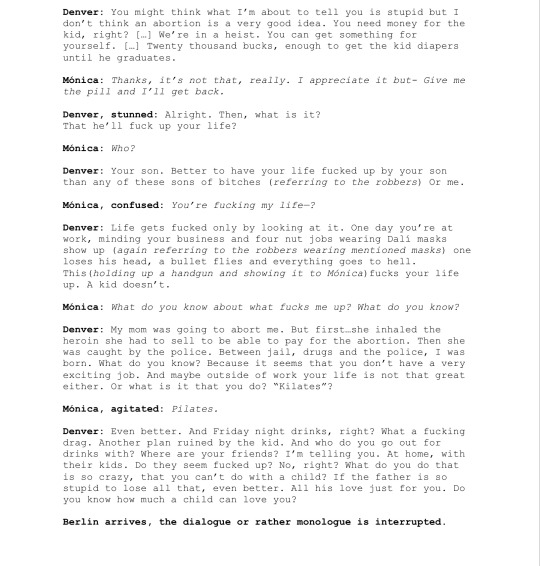
————Now my opinion / the actual post:
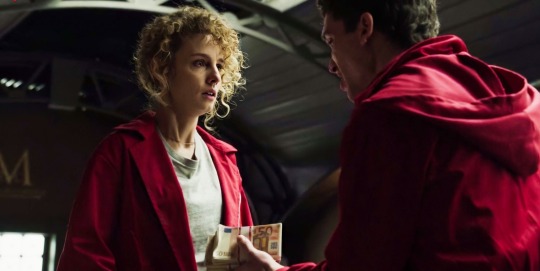
“You need money, right?” One might think that the amount of money seen in this frame (20.000,-€ approx. $21.701,50 according to Denver) is an exaggerated, way too generous gesture. Let me tell you, it is not.
According to a 2017 report from the U.S. Department of Agriculture, the average cost of raising a child from birth [to] age 17 is $233,610. If that made your heart skip a beat, take a deep breath before you read on. Incorporating inflation costs, it will be more like $284,570. Since that’s based on 2015 numbers, we can expect the cost will be even higher, babies born since then.
[…] This average includes everything from housing, food and transportation to healthcare, education and childcare to clothing, personal care items and entertainment.
Let me now remind you that Mónica is a secretary, so she likely earns (barely) enough money to be financially independent herself (taking into account that she lives near or maybe even in Madrid, her workplace, the Royal Mint situated there, so housing alone is hella expensive) and can’t really expect reliable support coming from the potential child’s father, Arturo Román, either, who initially denied support himself, their relationship a secret to the family and wife he already has. Phew.
Btw: A University of California at San Francisco study found that women who were turned away from ab*rtion clinics […] were three times more likely to be below the poverty level two years later than women who were able to obtain ab*rtions. 76% of the "turnaways" ended up on unemployment benefits, compared with 44% of the women who had ab*rtions.
“Enough to get the kid diapers until he graduates.” The problem or let’s say points raised above are now also being ridiculed or not taken seriously to say the least.
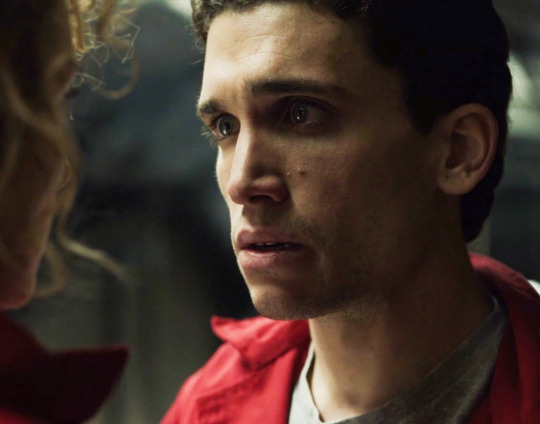
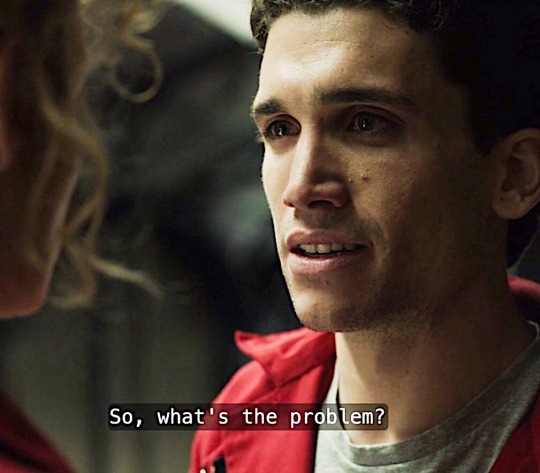
She takes the money, sticking to her decision however. “So, what’s the problem?” Or “Then, what is it?” A million additional things, Denver, believe it or not a potential child is a big deal. That and none of your business.
Also, see the reaction? How he stares at her in disbelief (and possibly even disgust, see the risen corner of his lips?). How he looks at her as if she were heartless, selfish, a monster – the picture often painted in this debate when it comes to women who decide to terminate a pregnancy. How he doesn’t respect her “no, thanks” and continues. Continues influencing her, later on even starts to mansplain his way into her stone cold heart. Okay, then let me continue as well.
“That he’ll f*ck up your life? […] Your son. Better to have your life f*cked up by your son than any of these sons of b*tches. Or me.” Call it ‘f*ck up’ or not – that is entirely her perception, her decision and I’d dare to say…she knows best.
First, because regardless of the fact that she is a woman and you are not – well it is indeed her life and, uhm, excuse me Denver, you’re no sibling, no friend, no acquaintance, quite the contrary, you have known her for what? Three minutes and already jump to conclusions?
Take the privilege of explaining her how a child would f*ck or not f*ck up her life?!!
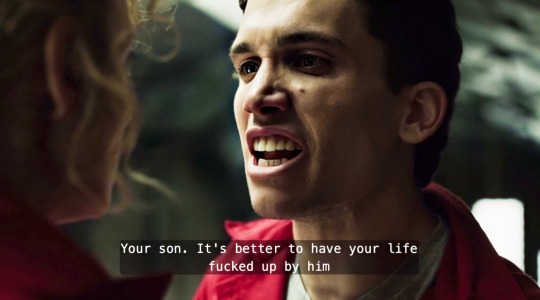
Secondly, what makes him assume the gender of this cluster of cells, this potential future life, this basis for a potential life that may later on develop into a life (it is not a walking talking baby boy already, my friend!).
Personhood begins after a fetus becomes “viable” (able to survive outside the womb) or after birth, not at conception.
Does it provide a smooth transition for that awfully funny and figurative “son” – “sons of b*tches” (org. Hijo – hijos de p*ta) line or is it literal propaganda?
Why does he say “your son”, although he cannot possibly know? I’ll tell you. In order to distract the audience from the fact that he is referring to a pea-sized basis for a potential life by painting the picture of an already existing male human being. Mónica, do you really want to murder your son? Mónica, does that cute little doe eyed baby boy really f*ck up your life? Yeah, propaganda at its best.
Also, another example for ridiculing the point “a child would destroy my life” by comparing an unwanted pregnancy to a literal robbery at gun point. Great one.
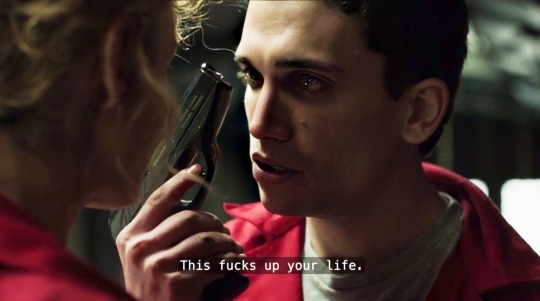
“This f*cks your life up. A kid doesn’t.” Do you see that raised gun, that is quite literally an extension of a raised index finger? Wow, the drama. On a different note, did you notice the symbolism? A weapon stands for death, murder and guess what is also often equated with murder.
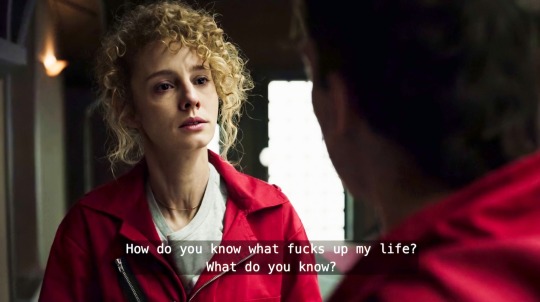
“How do you know what f*cks up my life? What do you know?” Finally. Exactly. He doesn’t know her, like at all. He doesn’t know her situation and no, he’s also not the pregnant one or anyone who would have to worry about that.
What do you answer to that, hmm? Let’s make this whole dispute even more emotional and dramatic. That ‘a cute little son isn’t as bad as a robbery’ didn’t convince her?
Let’s try with an extraordinary f*cked up and tragic life story, nobody asked for. Its goal? Showing the oblivious, naive, little secretary what real ‘f*ck up’ means, despite the evident lack of any sort of knowledge when it comes to her life (story). Again, conclusion-jumping and wallowing in prejudice at its best.
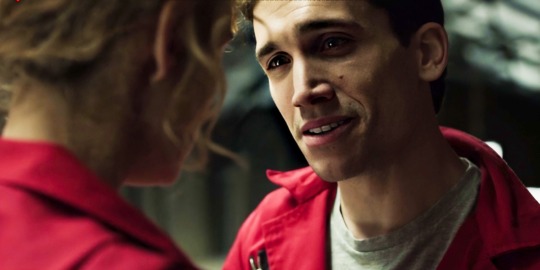
Have a look at his expression while ‘lecturing’ her. How disrespectful, how belittling. ‘Oh please, what do you know about life?’. On a wider scale: ‘How could we possibly trust women to rationally and with a clear conscience decide such things for themselves – concerning life and death, if they have not the slightest idea, living in their bubble of security and stability and no real problems’ etc. This is everything but taking women and their reasoning abilities, their judgement seriously.
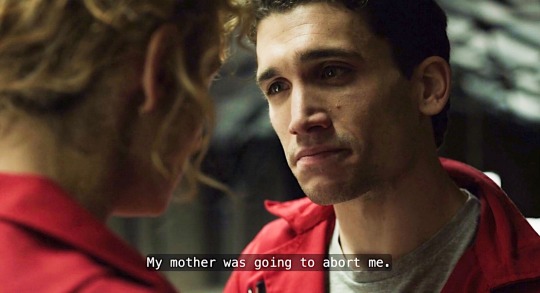
“My mother was going to ab*rt me.” Now the audience doesn’t only have the mental image of a potential cute little son, it is furthermore provided with the image of a living, breathing human being standing right in front of them. Just look at him and his pleading puppy dog eyes. No actual child actor could have done it better.
Thank god she did not go through with the ab*rtion, right? Oh thank god she was not allowed to.
Taking advantage of this frame to remind you of the fact that we are still talking about a POTENTIAL future life, not an existing one that is nevertheless put above the mother’s already existing life in this impudent, low and unfair debate.
“But first…she inhaled the heroin she had to sell to be able to pay for the ab*rtion. Then she was caught by the police. Between jail, drugs and the police, I was born. What do you know?”
1)Adding even more emotions, subtle accusations and drama to that oh so rational dispute? Check. Making his situation seem two thousand times worse than hers (which he, again, has no clue about)? Check. Subconsciously painting the picture of reckless, irresponsible drug addicts/ “lowlifes” or generally female members of “society’s margins” usually being the ones to abort and make it seem like the state’s or whoever’s responsibility to prevent them from deciding for themselves? Check.
2) Then he even tears her valid ‘what do you know (about my life)’ out of the initial context of being confronted with endless assumptions and prejudice and blows it way out of proportion in order to demonstrate the insignificance of … everything concerning her? Her background, her life, her reasons. Everything.
And FINALLY *drum rolls* the wild theories and hypotheses and presumptions she was dying to hear because since he, I repeat for the twelfth time, has no actual clue about her life, let’s make up one.
“Because it seems that you don’t have a very exciting job. And maybe outside of work your life is not that great either. Or what is it that you do? ‘Kilates’? And Friday night drinks, right? What a f*cking drag. Another plan ruined by the kid[…]” That and the entire following paragraph. Wow. All accusations thrown at women who decide to abort in one.
Because OF COURSE a middle aged, down to earth, intelligent, responsible woman like Mónica Gaztambide has no other reason for terminating a pregnancy than not being able to drink alcoholic beverages or party anymore. Because OF COURSE it is valid to assume a woman or any person for that matter one has known for half an hour and interacted with for literal five minutes has a boring enough life that would not be affected in any way by a pregnancy, birth and ultimately being forced to raise an unwanted child. Because OF COURSE Denver would know how much a pregnancy can affect somebody, especially one that is forced upon a person. Quite frankly he has no idea and no right. The audacity.
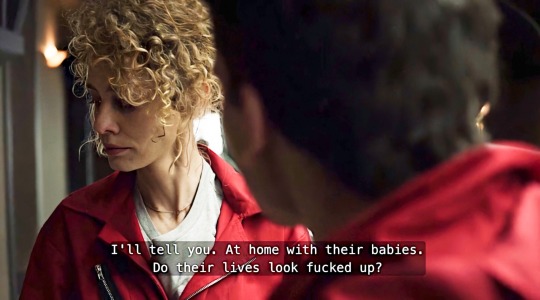
“Do [your friends who are also mothers] seem f*cked up? / Do their lives look f*cked up? No, right?” Because you know best. Not only regarding her life but on top of that also that of her friends. Because those pregnancies or motherhood in general did under no circumstances end a career or prevent them from pursuing one in the first place or cause the end of a relationship or force them to stay in a toxic or even abusive relationship or change their financial situation completely or rob them of their fragile financial independence and/or free time altogether or cause any (mental) health complications or … you get the point. Oh, and because their situations are completely identical to Mónica’s situation, that is additionally not half as dramatic as your life story. Of course, Denver.
Seeing the ‘rational’ argument doesn’t really work, let’s add yet another dramatic, emotional rhetorical question. As a precaution.
“Do you know how much a child can love you?”
How could she, being the heartless, cruel, selfish, irresponsible, ridiculous and impulsive murderess you’re ‘exposing’ her as?
⚠️ Another spoiler warning for seasons 3 and 4 and still 1.
Would Cincinnati - that’s her sons actual name, not alias – really love her like he does now?
Friendly reminder: his biological father (Arturo Román) let her know - right from the start - that he wouldn’t take on any responsibility whatsoever, regardless of his later statements about doing so. Why those statements don’t matter? Despite his awareness of her state, despite knowing she was pregnant he shortly after urges her on to steal the cellphone she is caught with right after the analysed scene, ready to risk her life and the potential life of his unborn child. Literally, because as soon as she is caught with it, Berlín orders Denver to execute her.
So to those of you who will now say “but- but Cincinnati is okay and has an amazing life and does love her” etc etc, first think certain things through. If Denver wouldn’t have spared her, if she didn’t just happen to get together with him and if the heist didn’t just happen to work out like that, what then?
Cincinnati would have a different name. What else? Well for one, he wouldn’t have a father (that is now Denver) like at all, resulting in possible daddy issues / issues in general. How I know Arturo, the biological father, wouldn’t be there for them, wouldn’t fulfill all his empty promises?
Did he canonically care about his son? Was he devastated that he was not given the possibility to see him or did he instead focus on that random book of his and his speeches about heroism and honour and so on? If he wouldn’t have called his wife by his mistress’s name and through that expose himself, if his family wouldn’t have left him all alone, don’t you think he would stick to them? Just to paint a picture of who the father is and how he behaves and what we can assume from that behaviour. So the probability was high she would’ve been left alone with I quote “all the love” and of course all the responsibility. It’s a thing, Denver.
Secondly, if she didn’t just happen to turn into a millionaire thanks to the heist working out, would she really be able to provide a life for Cincinnati? Would she really be able to remain financially independent? Would her life at her son’s side really be all peace and harmony if she wouldn’t just so happen to be able to live from heist money?
So many coincidences, so many risks and no security. Can we really blame her? Do we have the right?
With these questions I will end this seemingly endless post and leave you to think about it, reflect certain things and – if you want to – share your opinion(s) with me. Please don’t hesitate to do so, as long as those contain rational arguments and most importantly respect. Thank you for reading!
(Also: sorry for the extensive censoring, I had to, otherwise it wouldn’t appear in the tags.)
19 notes
·
View notes
Text
Queer Media One Tragic at a Time Has Reprogrammed My Brain
I find myself continually lowering my standards for the type of media I consume. Queer character? Check. Limited tragedy? Check. At least once instance of happiness? Check. Alright, that’s good enough for me. I LOVE THIS *insert media type here* SHOW, MOVIE, SONG! But, along with the good comes the bad and the ugly. Along with the brief instances of happy, complex, characters come the violence, the stereotypes, the woe. At this point, simply having a queer character that doesn’t die is the best I can hope for and that truly stresses me out. On a regular basis.
In Queer Youth Cultures, Karen said it perfectly, “I think there's a lack of homosexual characters who are presented in a positive and uplifting, or not even positive and uplifting but just represented on the screen or in the media in general. I guess it's a desire to have a voice. I know this sounds like pure shit, but it's a desire to have a voice, to feel that l'm being spoken for or even just represented. But that there's a voice up there that's representing, or at least trying to represent my own experience. I want to have a say in what's going on and I'm not willing to just accept the images that are represented in front of me as being the only possibility. I take it maybe beyond its limitations of what's there. I try to expand, try to just open it up to possible choices that exist for me that might not exist for the creators for that particular film or TV show. But I will be heard” (2008, p.175-176).

Shameless acceptance of the toxic gay dynamic:
While sexuality is particular to each individual, the social constructions of heterosexuality and homosexuality are cultural categories humans use to make sense of their sexuality (Queer Analysis, 2010, p.198). Shameless, an American comedy-drama television series based on a British show of the same name, stars Cameron Monaghan as Ian, a closeted teenage boy who realizes he is gay and navigates the complexities of his queerness as a social identity and Noel Fisher as Mickey, a closeted homophobic thug who upon realizing he is gay engages in a sexual relationship with the one other queer person he knows who also happens to be the kid he violently bullied. Ian and Mickey start as a toxic portrayal of settling and acceptability in its truest form. Ian is in a predatory relationship with an adult and still possess a great deal of internalized homophobia when he is essentially propositioned by Mickey and their turbulent relationship begins. Mickey is struggling between his desires as a closeted gay teen and his need to match the criminal ideals expected of his father and family name. They are an explosive pair that seem to cause each other physical pain and mental anguish, yet the fans are wholly supportive. Even when healthy potential partners are introduced, the toxic couple of Ian and Mickey are reunited time and time again because media has established a trope where queer characters are only allowed complicated togetherness. Queer characters are punished for choosing their queerness and therefore not allowed true love and happiness. Despite having this knowledge and nothing in common personally with these characters, I love this couple and I love this pairing, so I am part of the problem. I am a product of this generation of idolizing toxic behaviors between characters because unfortunately those are the only “happy” queer characters I have seen continually produced. I have settled into a pattern of accepting negative stereotypes as simply good enough. I have traded the simple fact that the queer character doesn’t die for the harsh reality of their lives.
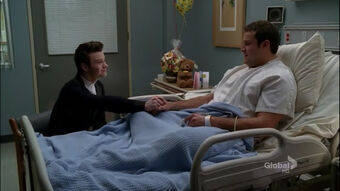
Another sad queer lacking Glee:
When queer characters are introduced, there are a set number of personality types and lived experiences they are allowed to have. Take Dave Kurofsky from Glee who serves as the closeted homophobic bully who after being outed in the “On My Way” episode attempts suicide and is comforted by the out-and-proud effeminate Kurt, a previous victim of Kurofsky’s wrath. We get to observe the pointed shift in Kurofsky’s personality from homophobic bully to repentant closeted queer, but the lack of character development unfortunately makes it difficult to feel sorry for him as a character. Instead, as an audience, we are forced to revel in “media representations of queer culture as essentialist, marking out the dichotomies between male and female, heterosexual versus homosexual (Queer Youth Cultures, 2008, p.175). Kurofsky is unable to learn what it means to be a queer man and grow from his internalized homophobia because he is coming his existence and framing his life experiences through that of Kurt; this is apparent when Kurofsky is unable to dance with Kurt at prom because of the perception of gayness. We accept Kurofsky’s story as powerful and real and heartbreaking because it is, but at what point do content creators have an obligation to tell the story a different way, in a positive uplifting light?
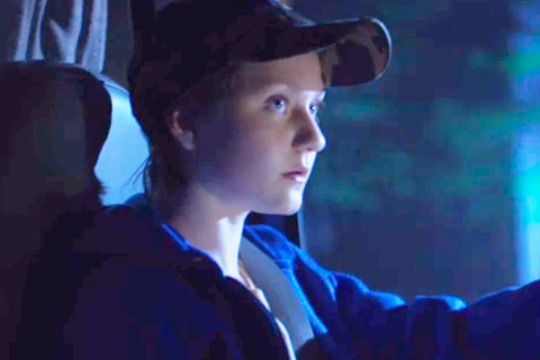
Degrassi: The Next Generation of bury your gays tropes:
Degrassi: The Next Generation, a Canadian teen drama television series, made history for tackling the tough social issues affecting teens, but frequently not talked about. They embraced diversity in their casting and range of topics covered while spearheading a progressive movement of introducing characters traditionally absent from popular media. Adam, a trans male character played by a cis female actress is a well-rounded first introduction to many into the lives of trans youth. The audience is familiarized with concepts such as passing and outing as well as the complexities involved in sexuality vs gender. Adam, besides being inaccurately portrayed by a cis woman, which is damaging to the idea that trans folks are the gender they have identified with rather than their gender assigned at birth, provides a much needed avenue of representation for queer youth in popular media. Continuing with our previously identified tropes, as a result of Adam being happy, relatively healthy, and well-liked he has to die. Queer characters are not afforded regular happiness in media they are given a taste then sacrificed as tools of writing via violence, sacrifice, or martyrdom. Adam is not gay bashed or driven to suicide as other queer characters are, but instead tragically killed as a texting while driving PSA. This death is particularly hard felt because Adam was truly shaping out to be a normal high school kid facing the complexities of life and surviving, but the creators, once again, took a queer character as the source for a lesson in some predetermined idea that queer happiness is short lived and tragic regardless of circumstance. There is a need for punishment of their queerness.

Queer punishment, a Supernatural concept:
What do shipping, fandoms, and heteronormative dominant culture have in common? Queerbaiting. Queerbaiting, “a term employed by media fans to criticize homoerotic suggestiveness in contemporary television when this suggestiveness is not actualized in the program narrative” (Brennan, 2016, p.1). A concept typically negatively connoted is a primary tool of heteronormative culture ensuring queer culture remains as a subculture rather than its own, established independent source of media. Audiences, particularly queer individuals, are forced to imagine scenarios and worlds where their identities are represented and dominant. “By creating a fantasy space, queer youth have an environment where they are free to explore many possibilities” (Queer Youth Culture, 2008, p.174). From these creative worlds come the likes of couples like Dean and Castiel (#Destiel) from Supernatural. The creators introduce intimacy and connectedness; the couple is ideal and non-stereotypical or superficial. Unfortunately, our trend of no happy endings for queer media continues because despite the fan observations and urging this couple is never acknowledged or confirmed as such. They instead give several seasons of romantic teasing culminating in a teary subversive confession immediately preceded by death and not just any death, a death where Castiel, an angel character is drug to hell. The sub context is overwhelming in deciding queerness is so offensive that any acknowledgement to the sort should result in punishment akin to biblical reckoning.

Lingua Franca, the road to universal language and communication:
Even as queer media continually evolves becoming evermore accurate and inclusive the conditioning I have been subjected to, as a consumer of queer media, completely reprogram my brain. While watching something as relevant and present as Lingua Franca I am unable to completely enjoy the film as I am waiting for the proverbial other shoe to drop. Lingua Franca is a progressive film about a trans Filipina woman seeking a path to legal immigration in Trump’s America. The film is written, directed, and stars Isabel Sandoval an actual trans woman of color and therefore the portrayal is very real. As a film about a trans woman, the pace is melodic and light while the subject matter is focused on the life of Olivia rather than her transition or identity as a trans woman. While watching the film, I found it beyond refreshing that there were no invasive surgery questions or blatant misgendering by supposed loved ones. That being said, as a first watch through, it was anxiety inducing; the lack of discussion regarding Olivia’s trans identity led me to worry for her safety in a cis-heteropatriarchal world. When Olivia is engaging in her relationship with Alex I see the natural connections, simplicity, sensuality, and beauty, but I also worry about the potential for the violence I have come to expect when viewing true queer happiness. The scene where Olivia is outed by Alex’s friend shifted the entire tone of the film for me as I watched Alex spiral and truly cringed at the thought of watching another film showing an act of physical violence against a trans woman of color. While that thankfully did not happen, the fact that I remained restless throughout the entirety of the film waiting for it alludes to this reprogramming of sorts that has occurred. Creators show queer characters as poor unfortunate souls brought down by their queer identities therefore, I have come to expect and root for in some regards, a victim. There are limited instances when I can truly enjoy a queer film without a sinking feeling in my stomach waiting for the catch, waiting to exhale and simply experience queer joy.
#queer representation#intersectionality#queer youth culture#tragic queer#shameless#glee#degrassi#supernatural#lingua franca
1 note
·
View note
Text
“PRIDE AND PREJUDICE” (2005) Review
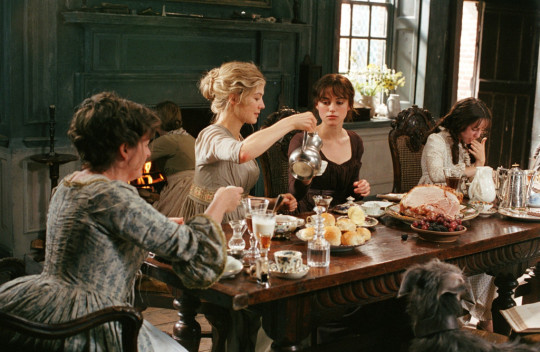
“PRIDE AND PREJUDICE” (2005) Review
To my knowledge, there have been at least ten screen (film and/or television) adaptations of Jane Austen’s 1813 novel, “Pride and Prejudice”. I believe it has been adapted more times than her other five novels. This is not surprising. It is probably the most beloved of her six novels. I have seen four of those adaptations, myself. And one of them is director-writer Joe Wright’s 2005 film adaptation.
“PRIDE AND PREJUDICE” starred Keira Knightley and Matthew MacFadyen as Elizabeth Bennet and Fitzwilliam Darcy. The story focuses on Elizabeth’s dealings with marriage, manners and other issues in the landed gentry society of late Georgian England. Elizabeth and her four sisters are encouraged by their mother to find a suitable husband before their father’s estate is inherited by a distant male cousin. The Bennet family is heartened by the blossoming romance between Elizabeth’s older sister Jane and a wealthy bachelor named Charles Bingley, who has rented a neighboring estate. But the family are unaware that Mr. Bingley’s even wealthier friend, Fitzwilliam Darcy, has grown attracted to the extroverted Elizabeth. However, obstacles block the path of true love. Mr. Darcy and Bingley’s snobbish sister Caroline disapprove of his romance with Jane, due to the poor behavior of Mrs. Bennet and her three youngest daughters. And Elizabeth has developed a deep dislike of Mr. Darcy, due to his own distant and haughty behavior. Through a series of setbacks and misunderstandings, true love finally flourishes in the end.
Wright’s adaptation of Austen’s novel was a box office hit and earned numerous award nominations, including a Best Actress nomination for star Keira Knightley. But like the 1940 adaptation with Greer Garson and Laurence Olivier, this 2005 film has attracted a great deal of criticism from Austen fans for its failure to be closely faithful to the novel. Many have complained how Wright changed the dynamics within the Bennet family. Others have complained by the less than sterile appearance of the Bennet estate and the movie’s late 18th century. As far as many readers were concerned, “PRIDE AND PREJUDICE” should have been set between 1811 and 1820 – Britain’s Regency era, since the novel was published in 1813. So, how did I feel about Wright’s take on Austen’s novel?
I might as well be frank. I did have problems with “PRIDE AND PREJUDICE”. I could have understood Wright’s decision to portray the Bennet household with a less than pristine appearance. The Bennet manor was not the first to be portray in this style. The Western home in 1963’s “TOM JONES” looked a lot messier. But Squire Western lived on the estate by himself, until the arrival of his daughter Sophie and his sister Aunt Western. Mrs. Bennet managed the family estate in Wright’s movie. One would think she and the house servants would be able to keep a cleaner home. And I was not that impressed by most of the costumes worn by the Bennets. I found them rather plain and worn for an upper class family from the landed gentry. Mind you, they did not have the same amount of money as Mr. Darcy or the Bingleys. Except for the Netherfield ball sequence, their costumes seemed to hint that they barely possessed enough money to scratch out a living. Yet, at the same time, they had both house and field servants?
I was not impressed by the change of dynamics between Mr. and Mrs. Bennet. They seemed a bit too affectionate in comparison to their portrayals in other movies. Wright’s decision to make this change seemed to defeat the purpose of Austen’s narrative. He forgot that the incompatible marriage between the well-born, yet caustic Mr. Bennet and the middle-class and boorish Mrs. Bennet was one of the major reasons that led youngest daughter Lydia to leave Brighton with the roguish George Wickham. Mrs. Bennet’s shrill manners and obsession with matrimony for her daughters, and Mr. Bennet’s cynical disregard for his wife and society led to their failure to discipline their youngest daughters – Lydia and Kitty. But we never see this in Wright’s film. He had every right to justify Mrs. Bennet’s search for future sons-in-law. But the affection between her and Mr. Bennet makes it difficult to explain their failure to discipline Lydia and Kitty.
I also had a problem with George Wickham. I felt sorry for Rupert Friend. He is a very good actor who was handed over a role that turned out to be a ghost of its former self by Wright. Friend is also a very handsome actor. But he was really not given the opportunity to display Wickham’s charm and talent for emotional manipulation. Worse, the Elizabeth/Wickham scenes failed to convey any real friendship between the two, before Elizabeth’s discovery of his true nature. They were simply not on screen together long enough to justify Elizabeth’s outrage over Mr. Darcy’s alleged treatment of Wickham. Wright’s treatment of the Charles Bingley character was also a problem for me. I am aware that Mr. Bingley has always sought his friend Mr. Darcy’s approval, regarding the other man as his social superior. But Mr. Bingley has also struck me as a more social and extroverted man. Wright made sure that his Mr. Bingley, portrayed by Simon Woods, was socially active. But he also transformed Bingley into a shy and reticent man. And the idea of a quiet Mr. Darcy and a shy Mr. Bingley as close friends does not quite seem right to me.
However, there is no such thing as a perfect film – at least not in my experience. Yes, “PRIDE AND PREJUDICE” is a flawed movie. But it is not the disaster that some Austen fans would have many to believe. Despite some changes in the characterization and the 129 minutes running time, Austen’s tale remained intact under Wright’s direction and Deborah Moggach’s pen. And a few of the changes made by Wright and Moggach did not bother me one bit. In fact, I found them rather interesting. One change in the movie involved the Elizabeth Bennet character. This “PRIDE AND PREJUDICE” delved more into the impact of the Bennet family’s shenanigans upon her psyche with scenes that featured Elizabeth’s brief flight from the crowds of the Netherfield ball, her penchant of keeping personal secrets from her closest sister Jane, and occasional bursts of temper. Many also complained about the film’s late 18th century setting, claiming that Austen’s novel was a Regency tale. I said this in my review of the 1940 adaptation and I will state it again. There was no law that “PRIDE AND PREJUDICE” had to be set in the 1810s because of its final publishing date. Austen’s tale is not a historical drama, merely a comedy of manners and a romantic tale. Besides, her novel was originally completed some time in the late 1790s – the same time frame as this movie.
Despite my complaints about the plain wardrobe for the Bennet family, I must admit that I was impressed by most of Jacqueline Durran’s costumes – especially for the Netherfield Ball sequence. I felt that the most interesting costume was worn by Kelly Reilly (as Caroline Bingley in the aforementioned sequence:

Some fans felt that Durran made a misfire in the creation of this particular costume, which they believed evoked the high-waisted fashions of the first two decades of the 19th century. They especially took umbrage at her gown’s lack of sleeves. What they failed to realize was that women’s fashion was in a stage of transition between the late 18th and early 19th century. Older women like Mrs. Bennet and Lady Catherine de Bourgh wore the older 18th century fashions, while younger females began wearing dresses and gown with a higher waistline. It made sense that Caroline Bingley, being familiar with the more sophisticated London society, would wear such a gown. There is a 1798-99 painting called “Madame Raymond de Verninac” in which the subject wore a similar looking gown:
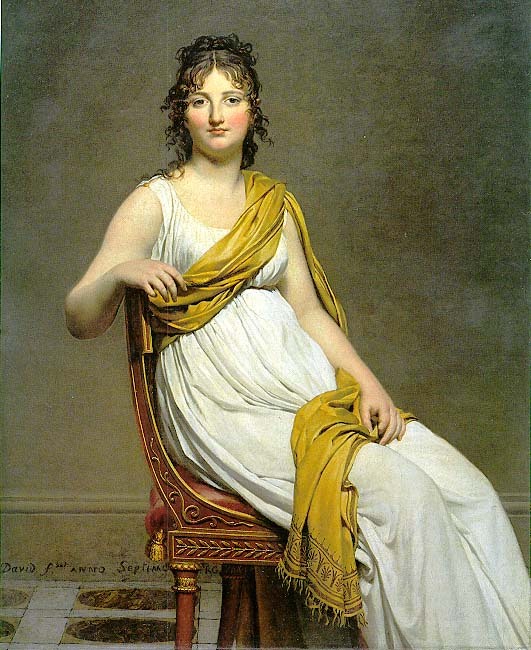
Other technical aspects of the movie that proved to be a lot less controversial. Roman Osin’s photography proved to be one of the movie’s biggest assets. I found it lush, yet sharp and rich in color. And it certainly did justice to Sarah Greenwood’s production designs and Katie Spencer’s set decorations, which captured the look of Britain at the end of the 18th century and the beginning of the 19th century beautifully. I especially enjoyed the photography featured in Elizabeth’s journey with her Gardiner relations to Derbyshire. Another segment that displayed Osin’s photography and Greenwood’s work beautifully was the Netherfield Ball. I especially enjoyed the tracking shot that touched upon the behaviors and emotional states of the major characters, before finally settling upon a secluded Elizabeth, heaving a sigh of relief.
Wright had the good luck to find himself with a first-rate cast for his movie. Jena Malone’s Lydia Bennet struck me as more of a show boater or poseur than any other interpretation of the role. Carey Mulligan gave ample support as her slightly older sister and emotional pet, Kitty. Talulah Riley did a very good job in capturing Mary Bennet’s self-righteous nature. Yet, at the same, she was surprisingly poignant – especially during the Netherfield ball sequence. Despite Moggach and Wright’s attempts to paint Mrs. Bennet’s determination to marry off her daughters in a more positive light, Brenda Blethyn still managed to capture the character’s gauche manners and silliness. And for that I am grateful to the actress. Donald Sutherland’s take on Mr. Bennet seemed less cynical than Austen’s take on the character. Thanks to Moggach’s script, Sutherland’s Mr. Bennet almost loses his bite. But not completely. Sutherland managed to retain some of the character’s sardonic humor. And I really enjoyed his performance in the scene that featured Mr. Bennet and Elizabeth’s discussion about her feelings for Mr. Darcy.
Despite my complaints about the characterizations of Charles Bingley and George Wickham, I cannot deny that both Simon Woods and Rupert Friend gave first-rate performances. However, I suspect that Woods was given more to work with, even if Moggach’s portrayal of his character struck a wrong note within me. There is an interesting post-script regarding Woods’ casting – he was Rosamund Pike’s (Jane Bennet) ex-boyfriend, when they filmed “PRIDE AND PREJUDICE” together. The movie featured only one of Mr. Bingley’s sisters – namely the gold-digging Caroline Bingley. Kelly Reilly’s take on the role strongly reminds me of Frieda Inescort’s performance in the 1940 movie – cool and sarcastic. Reilly had some choice lines, my favorite being her comment about her brother’s guests at the Netherfield Ball:
“I can’t help thinking that at some point someone is going to produce a piglet and we’ll all have to chase it.”
Yes, I realize that Jane Austen did not write it. But who cares? It is such a droll line, even if it was spoken by the unspeakable Caroline. I read somewhere that Joe Wright had convinced Judi Dench to portray Lady Catherine de Bourgh, claiming that he loved it when she “played a bitch”. And yes . . . Dench’s Lady Catherine was deliciously bitchy. On the other hand, Claudie Blakely gave a nice performance as Elizabeth’s best friend, Charlotte Lucas. She also had one memorable moment in which her character tried to explain her decision to marry William Collins, Elizabeth’s unpalatable cousin. “PRIDE AND PREJUDICE” marked the first time Keira Knightley worked with Tom Hollander. His Mr. Collins did not strike me as obsequious as previous versions. For some reason, Hollander reminded me of a socially awkward geek. The scene featuring Mr. Collins’ attempt to get Mr. Darcy’s attention struck me as particularly funny. Penelope Wilton and Peter Wight gave solid performances as Elizabeth’s aunt and uncle, the Gardiners. But I did not find them particularly memorable. Rosamund Pike made a very beautiful and charming Jane Bennet. She perfectly conveyed the character’s shyness and penchant for thinking too good of others.
Matthew MacFadyen was not that well known to U.S. audiences when he was cast in the role of Mr. Darcy. I realize that I am going to attract a good deal of flak for this, but I am glad that MacFadyen did not try to recapture Colin Firth’s take on the role. An actor or actress should never try to copy another’s performance. Frankly, I thought MacFadyen did a fine job on his own. He is the only actor to openly convey Mr. Darcy’s inability to easily socialize before the story’s second half, due to some silent acting on his part. I especially enjoyed his performance with Knightley featuring Elizabeth’s rejection of Mr. Darcy’s first marriage proposal. But Keira Knightley, as Elizabeth Bennet, contributed just as much to the scene as he did. For some reason, the actress has attracted a great deal of bashing from moviegoers. I will not try to determine the reason behind their behavior. But I will compliment Knightley for her performance. Like the other actresses who have portrayed Elizabeth, she conveyed all of the character’s wit, prejudices and exuberant nature. But thanks to Moggach’s screenplay, Knightley was given a chance to put a new spin on Elizabeth’s character. Due to the Bennet family’s behavior, Knightley was able to convey Elizabeth’s increasing emotional distance from them. Many critics did not care for this new spin on the character. I, on the other hand, found it fascinating and new.
Joe Wright’s “PRIDE AND PREJUDICE” has its flaws. There is no denying it. But I can say the same for the other three adaptations of Jane Austen’s novel that I have seen. For me, the movie’s virtues outweighed its flaws. And its biggest virtues were Roman Osin’s photography and a memorable cast led by the talented Keira Knightley and Matthew MacFadyen. This was Joe Wright’s first film and so far, my favorite he has done during his decade-and-a-half as a director.
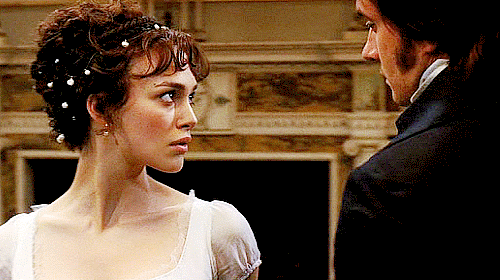
#jane austen#pride and prejudice#pride and prejudice 2005#joe wright#Keira Knightley#elizabeth bennet#matthew mcfadyen#fitzwilliam darcy#rosamund pike#simon woods#kelly reilly#brenda blethyn#donald sutherland#judi dench#claudie blakley#tom holland#jena malone#rupert friend#carey mulligan#talulah riley#tazmin merchant#penelope wilton#pip torrens#peter wight#period drama#period dramas#costume drama
27 notes
·
View notes
Text
The 100 Aesthetic/Preferences Tag
Tagged by: @blodreina-noumou ty babe!!
This is a tag game about AESTHETICS, not content, plot, characterization, etc. Just keep that in mind.
Rank the seasons from favorite to least favorite:
2 > 1 > 3 > 5 > 4 (me, petty: *won’t even put 6 on the ranking*)
2 - I think 2 has Octavia’s best look, very ‘Grounder In Training’ which was really really cute lol. Then there was the beginning of Clarke’s desent into grime, from pristine princess to getting weighed down with the dirt of her own emotions and percieved obligations and I liked to see it.
1 - everyone is clean and baby-faced and it reminds me of a simpler time. Was a fan of guard!Bellamy hair gel and all, it really brought out the douche in him. This season has my favourite Raven (she GLOWS) and Clarke Sky Babe looks. Jasper’s goggles. Dropship site was iconic.
3 - I appreciated the grimy aesthetic of season three because they really committed to the Goin’ Thru It.
The drastic shift in Jasper’s look was something I really liked. His boyish features are gone and now merely a ghost of innocence remains, in it’s place we have a more mature, hardened demeanor in the form of facial hair and a lack of cute, floppy hairstyle.
5 - we got the spacekru ‘clan’ look! In previous seasons we’ve seen clans have markers indicating who they belong to, Trikru with their earthy colours and wearing leaves, Azgeda with their furs and white paints, and Floukru with their ocean imagery, and now we see the survivors of apocalypse in their bluish-grey space tones styled in a way that makes it absolutely clear they’re all apart of the same group. We see a new headscarf for Emori, still very much herself but refashioned. And no glove! She’s completely comfortable with her new family. The scarf was very unique to her character so someone tell me why after all this they completely threw it out for season 6? Oh yeah it’s because season 6 isn’t real, it didn’t happen, I do Not See It.
All the boys glo-ed up. Loved that. All the girls started wearing their hair looser, Raven has her two strands sneaking out of her signature ponytail- she still very much looks like ‘Raven’ but everyone just in general looks more relaxed, like they’ve had a breather. In terms of the world, I loved the stark differences in the three main locations, and every one of them felt haunting but in different ways. Ghost lands. The wasteland of 5 was almost reminicent of the desert back in season 2, now devistated. The bunker was suffocating and chilling. The valley felt weirdly sinister in all it’s colours.
4 - eventually everyone looked peak skaikru, no longer delinquents in their various multi-coloured bomber jackets, marking their youth, but fully-fledged members of their group. I liked the way s4 almost paralleled s1 in look, they’re all wearing the same colours, but while they are all technically clean, they still look less presentable and exhausted compared to S1. Bellamy, again, like in season 1, is in his guard uniform but it’s more an upgraded and more mature version. In a way it looked like we came full circle. And Clarke and Octavia both going back to a more skaigirl hairstyle was the cherry on top. Luna’s costumes are probably my favourites on the entire show. I have no idea how we went from costumes of such intricasy and consistency to...’what in the name of halloween store clearance sale is that?’ in season 6.
6 - sanctum’s costumes were literally so ugly i don’t even wanna talk about it please don’t make me do it...
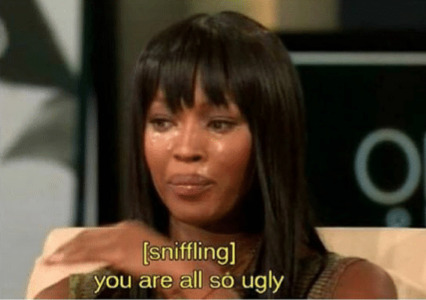
ok i go
1) Controversial ik but Emori’s Prime dress missed the mark. I liked the addition of the cape, but, again, it was so bare otherwise. There was no embroidery, no jewels, and the accessories they did give her were clunky and looked cheap. It looked too prom night. She was supposed to be royalty. And she didn’t look like it at all.
2) Absolutely hated the fact they put a pound of makeup on each of the space sisters’ faces. And the fact they gave them all unnaturally curled hair. Meanwhile Clarke and Octavia still somewhat look natural and ordinary so...what’s going on? And why?
Rank Clarke’s hair each season from best to worst:
1 > 6 > 2 > 4 > 5 > 3
some thoughts;
Not a fan of her season 4 hair, and i can’t articulate my dislike very well but why’d her roots get so dark? She never had dark roots in season 1, this character is a natural blonde, and yet over the seasons they became progressively darker and tbh? It started to irritated me. Also I don’t think the cut framed her face quite right? SOMETHING okay? Something about it......
Rank Bellamy’s hair/beard each season from best to worst:
3 > 1,2,4,6 < 5
The real debate: Bellamy in the blue shirt or the tan?
They both look the same to me. lol. Blue.
Clarke’s blue dress or pink dress?
Neither. Both weren’t very good looking. If you were holding me at gun point I’d say blue, but the cut did the opposite of help. And if they were gonna have a moment where Clarke, oblivious to her own *ethereal beauty* and not like the other girls, walks down the stairs ready to throw her hair into a messy bun and get sold to One Direction, they could’ve at least put her in a more suitable dress. Something a bit more glamourous, sophisticated, something to justify the 10 people in the room staring up at her in awe. It’s such a casual, tasteless dress? And she isn’t even wearing shoes? She isn’t wearing anything shiny, she didn’t do anything to her hair. We saw what other dresses and accessories Delilah had in her closet, the yellow and pink soft-flowing, feminine classy dresses and the pretty headwear she wore in her own short time in the season. But you give Clarke, your protagonist, that unflattering one? One that she so clearly hastily threw on and headed out in? She got two outfit changes, while none of the other main girls got any at all, and they were both ugly LIKE what was even the point?
Favorite Raven season: Her season 1 baby face just cannot be beat, she looks beautiful. And I only use that word very particularly.
Raven’s ark vest or red bomber jacket?
how about that red popper shirt from season 4
Raven’s ponytail or her s6 look?
Ponytail. It’s Raven. S6 look betrayed what her character was about.
Favorite Octavia season: 2! I love the baby grounder look.
Octavia’s hair in s2 (the braids) or s4 (the ponytail)?
The braids just because they were more interesting to look at.
Blodreina or Skairipa?
Blodreina. Like I said somewhere up there ^ that whole costume was a breath of fresh air.
Favorite Murphy season: S5!
Murphy with long hair or short hair?
I appreciated the rat boy look while it lasted, but the short hair makes him look good, while his other hairstyles pretty much were just there to contribute to the climate of his character.
Favorite Monty season: 5. Bout time they made him look grown. He’s actually a pretty ruthless and passive aggressive kid, the fact he looked so sweet in previous seasons really tricked a lot of the fanbase into believing he was some tiny cinnamon roll.
Favorite overall episode: I’m awful at seperating episodes. I just can’t do it lol
Favorite scene of all time: I just don’t have the best memory for these things. I quite liked the reveal of Blodreina, the transition is takes from Cooper in the very first arena fight to current day, and it switches from blue to red, and slowly reveals Blodreina. The music change gave me chills. Everything about the scene just felt really dark and eery. I was uncomfortable. And I loved it.
Biggest wish for s7: Visually/aesthetically, decide which style you’re going for. I’ve said this before somewhere but Sanctum was a confusing mess of sci-fi, royal, prom night, and divergent amity. Pick one and get back to me.
I want a better designed world. I want all the set and costume designers to actually communicate and work together to make the world look like something professional and not a cosplay convention on a cheap set with a big paper mache castle.
Also I’d love for all the girls to not be all dolled-up. Give Raven her ponytail back, I’ll even settle for the low pony. Give Emori her headscarf back. And go get them all some face wipes. Maybe give someone other than Clarke an oppurtunity to wear something besides their murder gear. And maybe make that something actually good looking. Put some effort in. Sheesh.
I don’t follow many people and most of the ones I do are hibernating lol. I fully encourage someone to steal this. But in the meantime: @johnmurphysreddit @awesomenell65
6 notes
·
View notes
Photo

When Worlds Collide (1951)
Stop-motion animator György Pál Marczincsak garnered pan-European fame for his pioneering Puppetoons series of short films in the 1930s. Sensing tumult in continental Europe, he fled his native Hungary to Britain as the Nazis rose to power in Germany. With the assistance of Walter Lantz (the creator of Woody Woodpecker), he moved to the United States, changed his name to George Pal, and attained American citizenship. In America, Puppetoons resumed with Paramount Pictures’ financing until 1948. Puppetoons, unlike most stop-motion films, utilized “replacement animation” – a form of stop-motion animation where a new hand-carved, wooden puppet would be used for each photographed frame rather than modifying the same figure for each successive frame. Though Paramount discontinued the series due to its increasing costs, Pal nevertheless remained in good standing with the moviegoing public and the studio’s executives. Transitioning from an animator/director to producer, George Pal took an interest in a genre that – since the silent era’s end – had been relegated to low-budget serial films and comic book stands.
As the world’s nations shuffled to take sides for the Cold War, the United States and the Soviet Union’s greatest engineering and scientific minds were imagining new possibilities in aerospace. The renewed interest in space flight and scientific discovery led to Paramount’s Destination Moon (1950), produced by Pal. Destination Moon was the first film released by a major American studio to consider a speculative human landing on the Moon. For Pal’s follow-up, he purchased a science fiction property gathering dust at Paramount. The property: When Worlds Collide, based on Edwin Balmer and Philip Wylie’s novel of the same name. With acclaimed cinematographer Rudolph Maté (1928’s The Passion of Joan of Arc, 1940’s Foreign Correspondent) as director and providing aesthetic expertise, When Worlds Collide is the origin of all subsequent apocalyptic movies where a celestial body smashes into another celestial body. In two inconsistent films that deem their characters’ humanity as secondary, George Pal rejuvenated an entire film genre in the United States – and Hollywood has never looked back.
In South Africa, astronomer Dr. Emery Bronson (Hayden Rorke) instructs American pilot David Randall (Richard Derr) to pass along confidential, unsealed photographs and research to his American counterpart, Dr. Cole Hendron (Larry Keating). Drs. Bronson and Hendron will warn the United Nations Security Council (UNSC) that a star named Bellus will strike and destroy Earth within a year. Shortly before the projected impact, Bellus’ sole orbiting planet, Zyra, will pass by Earth close enough to wreak gravitational and geologic devastation before the Earth’s ultimate destruction. Bronson and Hendron thus propose the construction of human spaceships – “arks” – to transport human survivors to Zyra just before Bellus arrives. The astronomers are not taken seriously by the UNSC. However, private donors such as wheelchair-bound businessman Sidney Stanton (John Hoyt) provide the necessary funds for the ark’s construction.
Various arks are assembled across Earth, but When Worlds Collide concentrates on the effort spearheaded by Drs. Bronson and Hendron and financed by Stanton. This American ark will also include co-pilot, Dr. George Frye (Stephen Chase), and Dr. Hendron’s daughter/assistant, Joyce (Barbara Rush). Joyce is attracted to David because 1950s science-fiction films always seem to have an obligatory romance.
With an acting lineup filled with B-movie stalwarts and future television stars (who may be recognizable by those who know their ‘50s-‘70s television), When Worlds Collide is hindered by stiff line readings and an emphasis on the mission rather than its human characters. Screenwriter Sydney Boehm (1952’s The Atomic City, 1953’s The Big Heat) has written a procedural screenplay, one where decisions about the ark’s construction, its flightpath, and the selection of its passengers are the film’s primary drama. From that screenplay, only John Hoyt, as the irascible Sydney Stanton, distinguishes himself in the film with his patrician sneering. Disaster films and invasion literature during and prior to the mid-twentieth century typically did not privilege individual viewpoints, and that trends continues in When Worlds Collide.
That is to the film’s benefit and its detriment. It is a mechanical motion picture, with the occasional reminders that humanity, collectively, is staring down its certain destruction. Once Drs. Bronson and Hendron have made their presentation to the UNSC, every character in the film is henceforth defined by the looming apocalypse. Whatever lives they lived outside their work are extinguished in service of constructing the arks. All over the construction facility, numerous signs read:
WASTE ANYTHING EXCEPT TIME
TIME IS OUR SHORTEST MATERIAL
The privileged few tasked with the ark’s construction and its piloting are but a fraction of a fraction of humanity. Even among the several hundred persons (unsurprisingly, due to a complete lack of imagination, they are all white) involved, everyone reacts differently to the situation they all share. Some are despairing, believing they have not lived a fulfilling life; some commit to their final purpose, subsuming their emotions in service of a space age Noah’s ark; some are possessive, concluding that their involvement with the ark makes them more worthy than others to embark the ship come doomsday. With precision, the elements comprising the ark’s first and final flight are assembled. Perhaps the most unrealistic aspect of When Worlds Collide is the uncritical adherence to the scientists by the faceless masses who construct the ark (the scientists’ hand-picked survivors are few, but these individuals’ placement on the ark is somehow never questioned). Interpersonal and inter-group conflict does not appear until far later than is realistic – the film’s romantic triangle is devoid of comprehensible motivation other than the fact that the film’s top-billed actor and actress should end up together somehow. Anyways, When Worlds Collide is not depicting a humanity akin to Star Trek at its most utopian. Thus, one must assume there will be at least some level of destructive human ego that confounds the ultimate task. Here the film falters, as the characters become the means to the end.
Maté and Pal choose not to show Zyra’s passing and Bellus’ catastrophic impact. Only their aftermaths are shown. On paper, any similar decision in a modern apocalyptic movie would be hounded across the Internet – but it works for When Worlds Collide. Here, the aftermath of Zyra’s passing is portrayed in a montage of film miniatures, matte paintings (mostly of the ark and its surroundings), and tactful slow-motion. With no computer-generated imagery to assist these scenes, the special effects team outdo themselves. Special effects artists Harry Barndollar (1946’s Cloak and Dagger, 1956’s The Ten Commandments) and Gordon Jennings (1942’s Reap the Wild Wind, 1953’s War of the Worlds) contributed to the miniature-heavy montage of Zyra’s approach. Their colleague, artist Chesley Bonestell (known as the “Father of Modern Space art”, Bonestell also worked on 1941’s Citizen Kane, Destination Moon, and 1953’s War of the Worlds) provided the novel idea of the ark beginning its launch on a one-mile mostly horizontal ramp (the miniature of this ramp was an enormous 700 feet long) rather than the conventional vertical launch.
Zyra’s approach is visceral terror in its timing (the effects are felt several seconds after scientific projections), sharp editing, and mass bedlam. Where the impacting sun will vaporize the Earth’s remaining inhabitants instantly, the passing planet will leave survivors left to wander or repair, perhaps futilely, the pre-apocalyptic wreckage. When Worlds Collide’s final minutes are special effects wizardry, partially redeeming the film of its ill-conceived storytelling and sketchy science. Yet, there could have been more in the film’s final minutes. George Pal envisioned a scene featuring an ark miniature resting on the surface of Zyra. Due to success of Destination Moon, Paramount expedited When Worlds Collide and rejected Pal’s request for an additional $5,000 (almost $50,000 in 2020’s USD) to cap off the Zyra scene. This forced Pal to utilize a Bonestell concept painting instead for Zyra’s surface – and it is too obviously concept art.
When Worlds Collide solidified George Pal as one of Hollywood’s best producers, and Pal already set his eyes on a sequel: After Worlds Collide (based on the novel’s sequel of the same name). But the failure of Conquest of Space (1955) led Paramount to nix the idea. The coming decade saw the Space Race between the Soviet Union and the United States and an explosion in American science-fiction films. Whether these 1950s sci-fi features contained spacefaring, exploration, or alien invasions, they invariably influenced succeeding entries into the genre that have made it dominant in contemporary Hollywood. George Pal, as a producer uniquely suited to special effects animation, became a science fiction and fantasy film innovator in the second half of his career. When Worlds Collide, though seemingly primeval compared to its sci-fi contemporaries a decade or so after, was fortuitous in its timing and for having George Pal as its producer.
My rating: 7/10
^ Based on my personal imdb rating. Half-points are always rounded down. My interpretation of that ratings system can be found in the “Ratings system” page on my blog (as of July 1, 2020, tumblr is not permitting certain posts with links to appear on tag pages, so I cannot provide the URL).
For more of my reviews tagged “My Movie Odyssey”, check out the tag of the same name on my blog.
#When Worlds Collide#Rudolph Mate#Rudolph Maté#George Pal#Richard Derr#Barbara Rush#Peter Hansen#John Hoyt#Hayden Rorke#Sydney Boehm#Chesley Bonestell#Harry Barndollar#Gordon Jennings#TCM#My Movie Odyssey
1 note
·
View note
Text
"gentleman jack" and why it's actually a fantastic show
so, we're only three episodes in, but this show is actually incredibly well-written. i will give brief explanations as to why right now, for i truly recommend it to anyone, especially to us useless lesbians/bisexuals who find ourselves thirsty for some actual wlw content.
1.) as aforementioned just above, it has a genuinely good storyline for lesbians. it is so rare to see any shows that have good lesbian representation (beyond the characters being heavily sexualized or having one of them be murdered in less than four minutes), and it does really well in portraying a healthy relationship. they actually communicate, they try to know about each other, they respect one another's boundaries, they support one another emotionally, and it isn't rushed- they're reasonable in their expectations and desires and they respect one another if one of them says 'no' or 'stop'. their passion is believable and they have undeniable chemistry. their smiles seem so genuine and wholesome whenever they're together, and that makes me so happy.
2.) this is merely a bias that arises from my personal aesthetics, but the time period in which the story occurs just brings me joy. the transition from the regency to the victorian era (as it takes place in 1832) is such a lovely time frame. the scenery, the homes, the clothing...it's quite accurate and the cinematography, as well as the usage of light, just makes some scenes look so beautiful and well-structured. also, social issues of this time are ever present and it doesn't just ignore important facts/beliefs of the time in order to further a 'woke' narrative-i will address this more soon. once again, like the relationship, it is very believable and it really seems like an 1832 english setting. also, the way they speak and their general mannerisms is also pretty well-displayed. i like that.
3.) they show the hardships of not only living as a lesbian, but a woman, in the time period. they have distinct gender roles and assignments and any deviation is perceived as perversion. they even utilize the kind of slander they would've partook in: whispers. distrust. lack of direct eye contact. they can't prove anything, and it wasn't even criminalized. lesbianism was heavily looked down upon and they portrayed such issues accordingly. and, so were women who took on 'manly' jobs. i like these conflicts and i like their presentation in the show. it's subtle, but extremely heavy by means of content and it allows you to feel worried for the characters in question without them directly being faced with an external threat. it's good at drawing these emotions.
4.) characterization!! is!! beautiful!! ann lister is such a badass- a lesbian with viewpoints that could be found in 2019? intelligent, witty, and empathetical in nature? brave and determined with absolutely no tolerance for bullshit? yes!! ann walker is actually a sweetheart- another lesbian who doesn't erase her femininity? clever, kind, and wistful who is so persistent and unfrightened, even of things she doesn't understand?? yes!! and so many more characters with such rich lives, who manage to have so much presence. none of them bore me, and that makes me happy. they're all complex and have their flaws (like how ann lister seems like she's manipulating ann walker, or how john seems like he's rushing his marriage with eugénie, or how marian constantly seems stressed and/or envious of her sister), but i think that is vital for good characters. they're well-written and they have so much potential for growth!! i love that!!
and there's a lot more. i apologize if my explanations are inarticulate or hard to follow, i just decided to ramble a bit. i'd love to have further discussion. :)
#gentleman jack#hbo#ann lister#ann walker#marian lister#john booth#eugénie pierre#halifax#england#1800s#wlw#wlw positivity#lesbian#sapphic
108 notes
·
View notes
Text
Movie Review: Transit
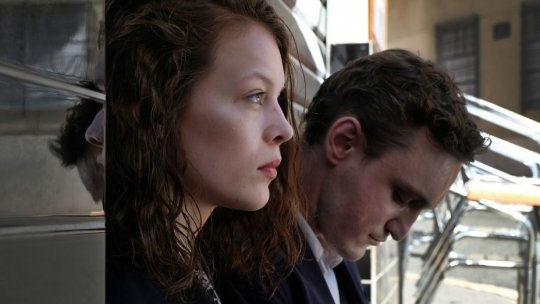
“Folk don’t like other people’s joy when they’re suffering misfortune.” Have truer words ever been spoken? There’s a reason single people prefer to spend Valentine’s Day with a Netflix subscription and a pint of chocolate chunk. The words are spoken by the unnamed narrator of Transit, who sees a lovelorn man in a cafe in Marseilles on a regular basis. The man has impersonated a deceased writer to try and flee a fascist state, and is now stuck in limbo, like the inhabitants of Casablanca.
It is not just a limbo of the body but of the heart and mind, as well. Georg (Franz Rogowski) is hired to deliver a letter to a famous writer, but when he gets to the writer’s hotel room he finds a scared proprietor and a lot of blood. The writer, one Franz Weidel, has killed himself in the room’s bathtub, though only hints and speculation are given as to why. That will be a recurring theme in the film, in which, as in life, many things are left unsaid and unresolved. Georg flees Paris hiding in a train car with a friend (Ronald Kukulies), who dies en route, leaving him alone in a strange city attempting to secure an exit visa to Mexico as the forces of an fascist government descend upon it. Here, he continually encounters a strange woman, who runs up to him on the street as though she knows him, then walks away befuddled when she does not.
We will learn the woman’s name is Marie (Paula Beer), and that she has a strange connection to the dead writer whose letter started Georg’s troubles. It is the kind of connection that seems like the stuff of soap opera, but against the odds is handled well by Christian Petzold. She is, you see, the estranged wife of the dead writer, and George has just accidentally impersonated that writer after being mistaken for him at an embassy. There is allure between Georg and Marie, yet Marie is unsure of what she wants: she wishes to find her missing husband, is having an affair with a doctor (Godehard Giese) who is more in love with her than she with him, and finds Georg intoxicating.
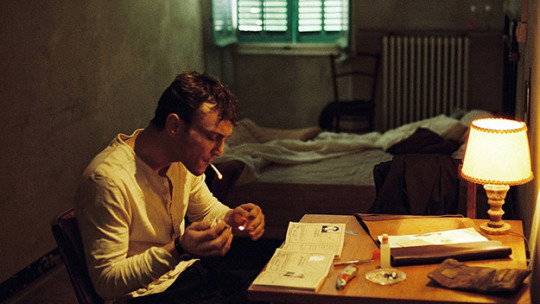
Petzold, whose previous film Phoenix was also patient and mesmerizing, and also about a refugee and a woman unsure of what she wants, is dealing here with material that could turn into a soap opera, but he deftly keeps things on a true emotional level by never giving in to melodrama. Witness the scene in which Georg and Maria are finally together, the doctor having been fooled into leaving without her (George is not always a stand-up person, and the same can be said for Marie). They melt into each other, Marie leading him from the window to the bed, and we wonder if the film will now become a love story. No. No sooner are they locked in embrace than Marie’s mind changes back to her husband again, and you can see the hope drain from Georg’s face. Yet what hope could he have had? He knew she was a married woman, one, in fact, who already was someone else’s mistress. He himself is impersonating a dead man. He must have known commitment was neither of their strong suits.
Any judgement we may feel about this is held at bay by the circumstances and the lack of Hollywood histrionics. The movie is based on a 1942 novel by Anna Seghers, one in which the invading government is naturally the Nazis; it has been transported here to the present day, and the fascists change to a generic, never-explained status. They are, narratively speaking, a maguffin, an unseen way to ensure these people cannot escape their circumstances; this is a movie about doomed love, and the idea of a fascist state is mere background and convenience. The love triangle between three adults is not the only ill-fated affection in the film. Georg, as himself, also befriends his late friend’s son Driss (Lilian Batman) and deaf wife Melissa (Maryan Zaree). Georg becomes a replacement for the boy’s father, despite knowing full well he intends to leave Marseilles and the boy behind. Does he care for the boy? Certainly, but there’s also a pattern of selfishness to him, a tendency to pursue what he wants in the short term without much thought toward the long. Such characters are generally portrayed as shallow or villains, but Petzold here gives us one whose selfish desires happen to also be selfless. Georg is a study in contrasts.
The previously mentioned narrator, who we will learn owns a cafe, says early in the film that ports are places where stories are told. Surely, he has seen many more stories come and go other than Georg’s, and will see many after. The cafe, the narrator, the sense of claustrophobia all make me draw comparisons to a personal favorite short story, Hemingway’s A Clean, Well-Lighted Place, in which two employees of a cafe debate the life story of a reserved, elderly patron. It is a story that creates a world out of only thoughts. Hans Fromm, a previous Petzold collaborator, creates this one out of little more than cobblestone streets, cramped buildings, and ships sailing far off in the harbor; the feeling of being stuck reaches into the emotional, so that the tight physical confines reflects how the characters feel about their situation. A haunting score by Stefan Will, also a Petzold regular, mostly loops but succeeds in adding to that sense of being closed in with something, be it jackboots or the results of your own actions, getting nearer all the time. By the final frame, in which all seems lost, Georg nevertheless appears to be in peace, or at least resignation. Possibly he just wants out of limbo, any way he can get there.
Verdict: Must-See
Note: I don’t use stars, but here are my possible verdicts.
Must-See
Highly Recommended
Recommended
Average
Not Recommended
Avoid like the Plague
You can follow Ryan's reviews on Facebook here:
https://www.facebook.com/ryanmeftmovies/
Or his tweets here:
https://twitter.com/RyanmEft
All images are property of the people what own the movie.
8 notes
·
View notes
Text
The Last of the Starks - Random thoughts on Episode 4
It started so promising though
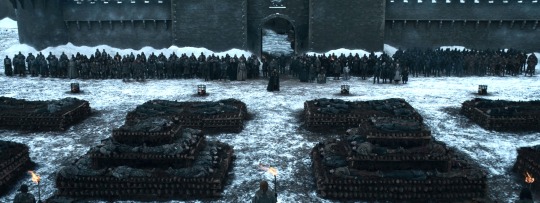
This fourth episode opened with the aftermath of the Battle of Winterfell and a tearful funeral to bid farewell to the departed characters. Ramin Djawadi offers some more of his genius to score the scene… and that’s about his only meaningful contribution to the episode. What a shame after the mastery he displayed in the previous episode. The rest of this one is underscored with reused bits and pieces that sometimes work (Brienne and Jaime were scored by an unreleased cue that worked - but strangely previously accompanied Tyrion, Shae and Sansa at their wedding and later during Tyrion’s trial; Littlefinger’s theme reappears as Sansa makes the decision to tell Tyrion about Jon’s parentage) and frankly sometimes are total misses. Take the scene where Cersei and Dany’s forces face off at the gates of King’s Landing. It’s scored by a mashup of a cue that was previously used for the Boltons and a snippet from The Spoils of War intertwined with I Choose Violence. And to top it off the credits that roll right after a scene that should be deemed as tragic are accompanied by Shall We Begin, the same that ended Dany’s arrival at Dragonstone in 7x01. Hardly fitting, right ?
I have read that Missandei’s death reminds the viewers of Ned’s death. Well, Ned’s death was followed by Goodbye Brother, a sorrowful and quiet variation of the Stark theme - proper for mourning. Finishing here with this triumphant variation of the Targaryen theme removes any occasion to mourn for Missandei; some other episodes even finished off without any music at all. And if they really wanted a triumphant cue, the triumph is all for Cersei here so a variation of The Rains of Castamere would have worked better than Dany’s theme. This is absolutely not a victory for Dany here
Please do yourself a favor and go listen to I’m Sorry For Today by Ramin Djawadi. Then tell me this is not a better cue to end this episode. Wanna know something else ? It’s Greyworm and Missandei’s love theme. So… I just want to say a big no-no to whoever was in charge of music here
And then it spiraled down
Time constraints are back and it makes everyone worry about the rest of the season. The show already struggled during its entire seventh season with these problems of days/weeks spanning within minutes of an episode not to mention characters maddeningly being able to teleport literally anywhere they were needed to be. Well, it’s back on and it hurts everyone from the audience to the story to the characters themselves. While the first three episodes seemed to have learned from the previous mistakes by allowing the gravity of the situation at Winterfell to be really felt - giving the battle against the dead and the loss of characters much more impact - this installment reverts to what drew audience away from S7 by trying to pack too much in an episode that suffers from the lack of impact these developments should - in theory - have on viewers. In previous seasons, this episode would probably have been divided into two or even three episodes. I’ll say it again, I still don’t understand why HBO allowed the seasons to be shorter when 10 episodes per season was clearly a good rhythm. This decision to cut S7 and S8 down did nothing good to the show
Anyway we lose more characters here and that’s the big problem. It seems that the previous episode pulled back its punches and restrained from killing too many just to create an effect of surprise and shock in this one. But that’s just about it. There’s shock but no lasting emotional punch. We lose Rhaegal and Missandei but we hardly feel anything other than pure shock. There is no sadness, no real emotion. They’re just gone and on we move. It’s like the whole Viserion situation all over again only worse. Losing Rhaegal so soon and in such an unceremonious way serves in theory to create shock. Except the fact is, it only comes off as writing off an asset that is not needed anymore. And very poorly at that. What use was Rhaegal then apart from having Jon fly him for a few cool scenes ? In this case I’d have preferred him to die in the Battle of Winterfell
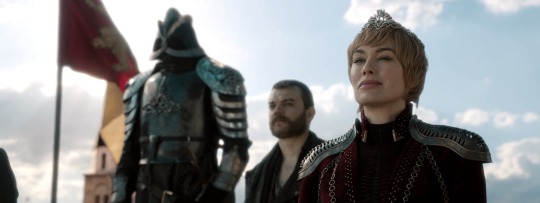
Since Dany lost Rhaegal, I don’t really see any point in her losing Missandei as well. Her dragon is largely enough to make her tip over the edge. Unless Missandei’s death furthers Greyworm’s story instead. Dany is already on her way to end up completely alone, having lost Jorah, most of her army, now her confidante and it remains to be seen how her commander will react to the death of his love. That was even confirmed by the producers as something very intentional. Varys is also lost to her and on the verge of taking Tyrion with him. On a positive note, Lena Headey continues to shine but I think Emilia does a tremendous job as well in portraying Dany’s descent into darkness
Jon and Dany are sinking and drag everyone with them
In any case, Dany and Jon seem headed for disaster. He still cannot say I love you back and what little faith I have left in Jon compels me to think he at least will not participate in the mass murder Dany seems to be leaning into. This at least is an aspect I am glad was not rushed over. The gradual transition of Dany from hero to tragic and morally questionable protagonist (to avoid the V word) is not - as some claim - too sudden to be credible; we have seen the seeds planted firmly in S7 and even earlier. Dany has my sympathy because I can still recognize her story as a tragic one and I feel for the losses she suffered. But in terms of ruling and politics, she’s no match to Sansa whom the remaining players still seem to take no notice of, as one of the best fitted rulers around (if not the only one)
Notice that Jon and Dany’s one-on-one scene is silent. There’s no music there, no Truth variation (thankfully!) to underscore it, a big contrast to the Jaime/Brienne scene. There was no romantic context to read here. Another observation : she uses touch as a means to get to Jon, just like Sansa did
Then there’s the Jon problem. I don’t know what to say about him because I hardly recognize the character. Who is this man who doesn’t even pet his direwolf ? Now I’m happy that Ghost gets a better ending than Rhaegal but this is a big disservice to a character that used to be much more important not just for the story but to Jon as well. Plus he keeps pushing his allegiance to Dany on his siblings and I bet Sansa was THIS close to blurt out loud that this was HIS allegiance, not HERS
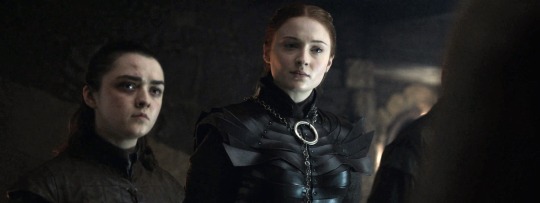
And I can’t even begin with Jon still constantly shutting Sansa down. Anyone can literally understand the benefits of letting soldiers rest. And it’s not ‘provoking’ as Tyrion later states. It’s basic human concern mingled with a touch of military savvy. I wonder why everyone misinterprets literally what comes out of her mouth. It doesn’t take an A++ military strategist to come up with this kind of suggestion. Yet BOTH Dany and Jon shut down this basic guideline from Military 101. Sansa can’t even be bothered to argue with Jon anymore and honestly I don’t blame her. It’s up to Arya to call him on his bullshit
On a positive note, once again, Arya and Sansa synchronize themselves by holding their hands behind their back at the war council - a nice way to present a united front. Notice however that this time around, Arya is better at hiding her displeasure at Dany than her sister when in S7 she was pretty vocal about the Northern lords. Usually Sansa is the more diplomatic one, yet this season she can’t help but speak up to Dany. One then remembers Sophie Turner’s comments on a ‘more passionate fight’ this season than a political one. Sansa ‘loses it’ because she is triggered about Jon and Dany
And for an episode called The Last of the Starks its pivotal scene feels a lot underwhelming. First let this fact sink in : this is the FIRST AND ONLY time that all the Starks share some screen time alone and speak as a family. Yes these kids have never interacted onscreen before. Anyway, Arya and Sansa finally learn the truth of Jon’s parentage. Yet we’re denied the actual telling and their reactions. Jon doesn’t even do the deed himself; instead Bran does it. Was Jon ever really needed then ? I’ve seen speculation that Jon specifically refrained from telling them himself so that he could technically keep his word to Dany. Why not but still frustrating
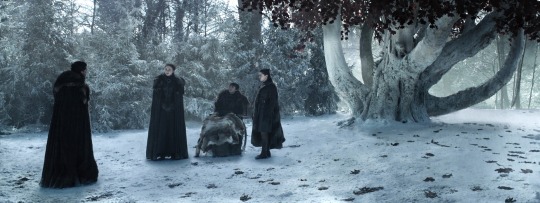
The next time we see Arya, she’s on her way south. So is Jon. Only Sansa seems really affected by what she has learnt. And for a house that places so much importance on the pack as family, you have once again a family that is not only divided because of Jon’s parentage, his allegiance to someone all of his siblings haven’t praised a single time but also geographically as two head south - possibly to never return - and two stay home, one of whom is not really part of the family anymore. So what happens to 'The pack survives’? Are they even a pack anymore ? Were they ever ? Sansa alone seems to still cling onto this futile notion. Jon leaves everything that ties him to the North behind, from Ghost to Sam and Tormund, not to mention his cousins. And yet, there’s still NO GOODBYES
I’d speculated before that Jon and Sansa might argue more over his Starkness. That seems unlikely now since the two haven’t had any one-on-one scene since the first episode. Given how Jon treats her I kind of stick by my point that he doesn’t deserve her. With only two episodes left, even if Jon magically reveals that he was playing some kind of game, this late in the endgame would feel cheap and effectively rendered less impactful
And on Sansa, again the time jumping does a great disservice to her - but that’s not the only time her character is dealt a poorly with. The framing of this installment makes it like Sansa couldn’t wait to snitch on Jon to Tyrion. Instead, a lot of time has passed per the producers who told us that this was a very thoroughly thought decision on her part. Well, that wasn’t what transpired on screen and if really some time has passed, then her onscreen upset appearance is not even a reaction to Jon’s secret
Anyway Tyrion asks her if she is alright. She is not. Cue the parallel to Littlefinger’s ‘what do you want that you do not have ? Why aren’t you happy ?’ This episode clearly points out Jon as the answer. And it’s not just her protectiveness over him - also, wasn’t HE supposed to be the one who protects her? - it’s the look of pure unaldultered adoration and fondness she shoots at him during the celebrations only to be tarnished by what everyone interprets - rightly - as jealousy over Dany. Notice that when she’s had enough and goes, Jon notices. Why she keeps being so faithful to him is a bit beyond me honestly but hey I don’t have Sansa’s patience with everyone else’s bullshit
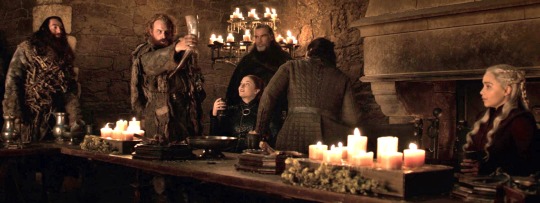
On Jaime and Brienne : I was happy they got together and then mad at Jaime for going but I can’t blame him really. Sitting out the rest of the war was never a viable option for him and I like to think that Sansa subtly prompted him to go with her comment on Cersei
Logics fly out of the window
As many pointed out, the logistics of I-Can-Magically-Teleport-Myself -And-My-Fleet-Euron are all but credible and the odds of hitting a flying dragon not once, not twice but three times in a row and then miraculously miss one dragon with a dozen simultaneous arrows are downright ridiculously low. But then again… a flying Dany could not spot the Iron Fleet when she was airborne. So let’s just not dwell too long on this one
Sansa did not catch on PolJon. When Arya tells Jon she respects his decision to kneel in order to bring Dany’s forces north, Sansa is stunned. But previously, we thought that she had understood why Jon did it when she was conversing with Dany. Apparently not
Not a bad episode really. But clearly, the lesser of S8 so far and one that’s very worrying over the final two that have so much to wrap up.
#game of thrones#got#game of thrones thoughts#got thoughts#got meta#game of thrones meta#sansa stark#jon snow#daenerys targaryen#arya stark#cersei lannister#jonsa#anti jonerys#anti-jonerys#jaime lannister#brienne of tarth#tyrion lannister#jaime x brienne#ramin djawadi
81 notes
·
View notes
Note
Do you think Eren could be the father of Historia's baby? I've seen a few theories, some really long and detailed, but most of them leave me perplexed. Sorry if you've answered this question before, but I couldn't find anything in your tags.
Hello anon!
Don’t worry I had never talked of the topic before.
Well, as for now I don’t think there is really much build up to Eren being the father. That said, it is true that sometimes Isayama’s pace has problems and so some transitions are not very fluid (for example, the whole plot point of Historia being pregnant is not prepared in any way and this is why people were left confused and even hurt since we could not see why she ended up in that situation).
Personally, I don’t think that Eren being the father is necessary at all story-wise or character-wise. The flashbacks have already shown us an Eren determined to do anything in order to avoid that the people he loves inherit one of the nine titans and this includes Historia as well. Moreover, the flashbacks have also shown us how Eren was never a fan of the diplomatic solution proposed by Hange and had his doubts about it since the beginning. In short, he had already all the attributes which would lead him to act the way he is doing now. It is true that we definately lack a last piece reguarding his character and his motivations (a specific piece of information or something which happened and convinced him to act), but this doesn’t necessarily have to do with Historia’s pregnancy. I actually think it would be a weird choice for two reasons.
1) Eren Kruger clearly talked about Mikasa and Armin and not Historia. To make Historia and the baby Eren’s main motivation would mean to basically retcon what Kruger said. It is true Kruger’s words might have some kind of other meaning, but as for now I have trouble imagining it, so I think the simplest thing is to assume that Eren’s main wish is to save his friends. If Isayama manages to come up with an alternative and satisfying solution to justify Historia’s absence from Kruger’s words, then fine, but until then I don’t think they can be easily discarded.
2) Historia and Eren’s love story would basically be a love story which happened off-screen and this is an odd way to go at it, no matter what. The only possible hint of a romantic interest on Historia’s part is Historia blushing when Eren complimented her. I can not think about any other thing. The rest of their interactions (among which there are far more important ones) are not coded romantically at all and even that little scene can be read as Historia simply being embarassed. It is not that much in terms of set-up. There is also the obvious fact that none of the 104th talked about a possible love story between Historia and Eren. They are the ones who immediately noticed Hitch’s interest in Marlowe and Mikasa’s interest in Eren and who mocked Eren about being super-dense. It seems strange to me that none of them had thought about Eren and Historia having a soft spot for each other, especially since they are all shown kinda close to Eren just a year before the attack on Liberio. Basically, it is not impossible that Historia and Eren had a hidden affair, but at the same time it seems a little forced even if more flashbacks might give more context and justify it a little. All in all, though, having a love story between two major characters develop off-screen and then show it through flashbacks is not a very brilliant move and it risks to feel cheap (again, never say never and this is just my opinion). What is more, there is the obvious question as to why Historia and Eren decided to have a child when they are in such a messy situation. Wouldn’t have it been wiser to wait for better circumstances? All in all it would seem to me a way to cheapen and trivialize the situation Eren and Historia are in and to trivialize their choices which so far have been framed as negative and as important ones.
This is my opinion so far.
Thank you for the ask!
34 notes
·
View notes